#Darcy/Zeitgeist
Text
zwan/smashing pumpkins 2000s magazine covers
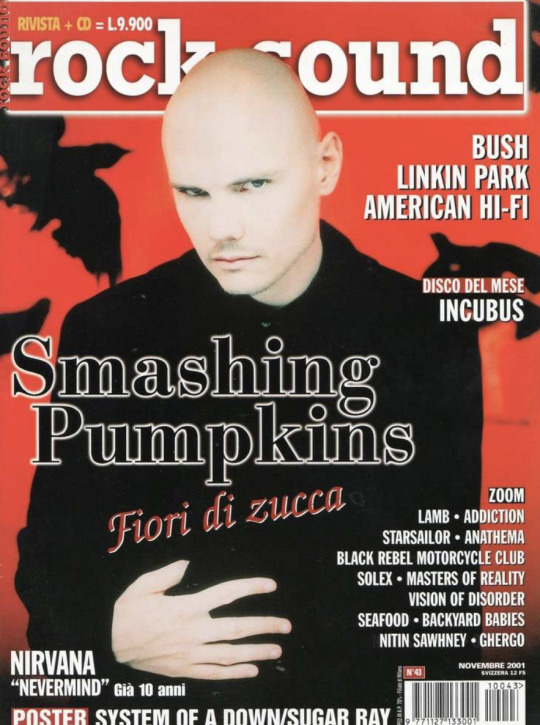
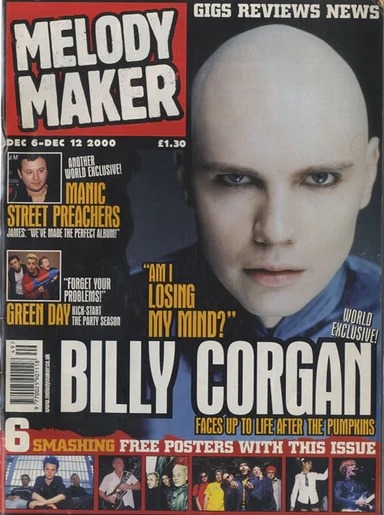

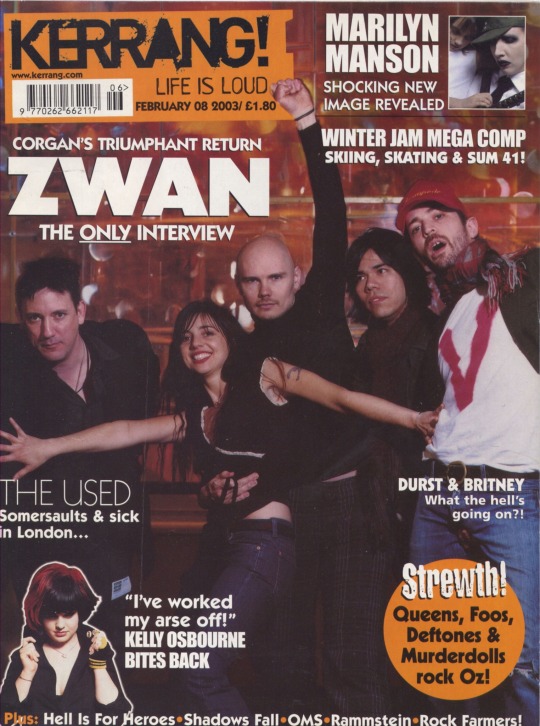

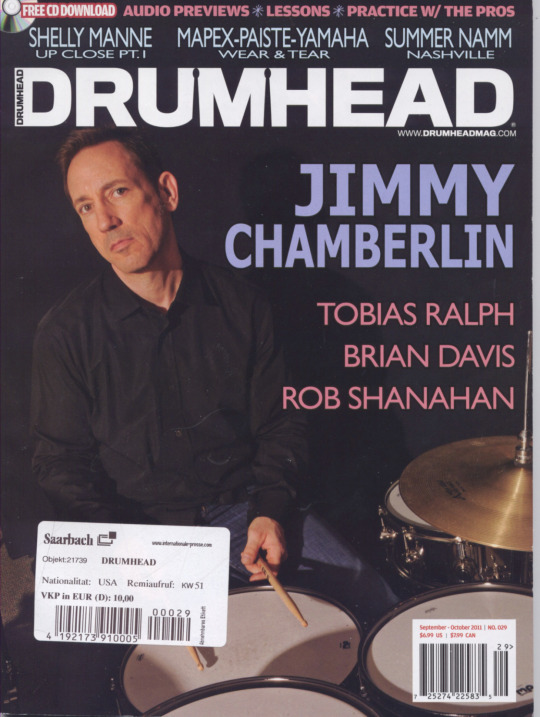
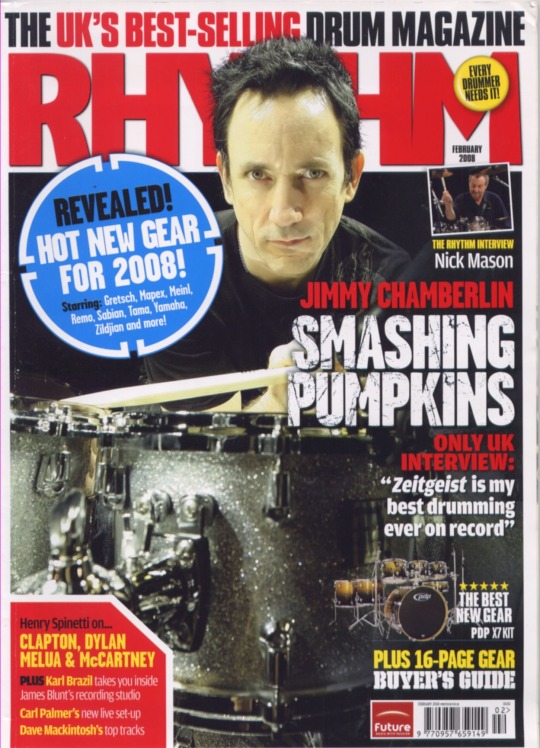

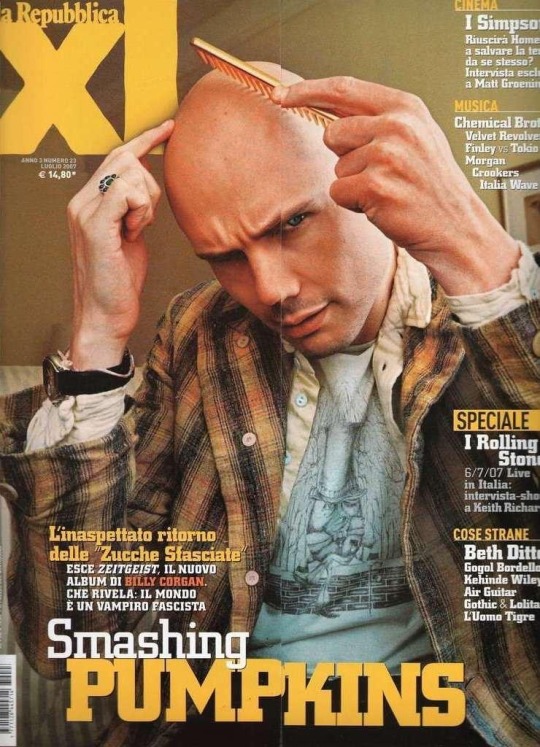

#smashingpumpkins#the smashing pumpkins#90s rock#billy corgan#darcy wretzky#james iha#jimmy chamberlin#90s#alt rock#alternative rock#magazines#zwan#zeitgeist#2007#zwan band#early 2000s#2000s
10 notes
·
View notes
Text
“What a delightful library you have at Pemberley, Mr Darcy!”
“It ought to be good,” he replied, “it has been the work of many generations.”
“And then you have added so much to it yourself, you are always buying books.”
“I cannot comprehend the neglect of a family library in such days as these.”
This conversation is intriguing because, as is often the case in P&P, there is so little narrative framing or comment that you have to make quite a few assumptions based on how you read the characters. We don’t even hear Elizabeth’s reaction to this interchange and don’t know how she takes it (though when Darcy later tries to talk to her about books, she’s sure that their tastes are so wildly different that they won’t have anything to talk about).
In any case, both fans and critics have come away with a lot of different interpretations of Darcy’s book-buying sprees and, in particular, what he means by “such days as these.”
I just read an article that dismissively characterized it as a stuffy civilization-is-falling-down-around-us-in-these-degenerate-times thing showing the basic conservatism of his mindset, and while that article was particularly hostile, it’s a pretty common reading. And you can read it that way, but frankly, it doesn’t seem the most natural reading in the context of either the scene or his overall characterization.
Darcy is repeatedly associated with books and reading and general intellectualism. The Pemberley library links his family pride and his sense of legacy with his personal inclinations—as an individual, he’s bookish, clever, and fairly cerebral. He reads, he buys new books, he enjoys philosophical debates, his response to Elizabeth’s assertion of their different tastes in books is “cool, then we can argue about them :D”, he encourages his teenage sister’s artistic interests and defends her disciplined approach to them when she’s not even there, he collects fine and apparently borderline-incomprehensible paintings, he’s dismissive about the expected accomplishments of upper-class women in favor of reading (partly bc Elizabeth has been reading, but it’s not surprising that a man responsible from age 23 for the education of a young girl has Thoughts on the ongoing female education debates of the time).
All of this is to say that Darcy is engaged with what was then contemporary culture and discourse. This is especially the case if you go with the time of his creation, 1796, but it doesn’t make a huge difference because these debates were still ongoing in the 1810s, and he rarely refers to specific figures and instead prefers more generally familiar concepts and arguments (or chooses to rely on those in conversation with women), and in any case, the English artistic movements of the 1810s owed a lot to those of the late eighteenth century.
And a big eighteenth-century debate was about the merits of modern art, especially literature, compared to ancient art. Historically, there was a lot of deference in English literature to ancient models and dictates, and controversy over newer forms like the novel (in English) but also in poetry and drama and essays. To some people, it seemed like art was going horribly astray by diverging from the ancients (despite the continuing strong influence of Classicism). Others thought the artistic movements of the time were fucking awesome valuable and important, which is generally Austen’s position (most famously in the defense of the novel in NA).
So when Darcy speaks of “such days as these,” I don’t think this is coming from snooty disengagement from the current literary zeitgeist, but rather, the reverse. He’s seeing all these ideas being hotly debated in various essays and treatises, and the English novel taking modern form, and poetry undergoing changes that will only become more drastic, etc etc, and thinks—this is important. Anybody with a family library should be adding the literature that’s coming out at this time.
TL;DR I think Darcy has an affinity for modern art/literature/culture in any case, but also, is so convinced of the importance of the literary “moment” he’s living in that he thinks he’d basically be shaming his ancestors if he didn’t include it in the collection that he’ll pass down to the next generation as it was passed to him.
#it's not just that people like him need to maintain family libraries with what's currently out there#but that he thinks that what's happening /right now/ is a really big deal that needs to be added for its own sake#i find it a bit weird that this reading seems unusual but some people are very committed to stuffy conservative darcy so#i do go with the c. 1796 setting which makes this fairly funny... lyrical ballads is coming out in two years#and darcy can't know that! it's just. something is going on! clearly! what is the point of being rich if you don't preserve this stuff???#anghraine babbles#austen blogging#austen fanwank#lady anne blogging#anghraine's meta#fitzwilliam darcy#pride and prejudice#jane austen#tangentially: this is kind of associated in my head with how the preceding darcy-like characters are pretty much all 18th century#elizabeth has this whole beatrice/rosalind legacy and the debt to much ado about nothing is obvious#but darcy isn't like benedick. he's like... lord orville if he were interesting.#so he's a fairly distinctly /modern/ man in the original context where he's often now seen as a quintessential/old-fashioned figure#and it makes sense that he would have a lot of affinity with modern culture where elizabeth is more detached
1K notes
·
View notes
Text
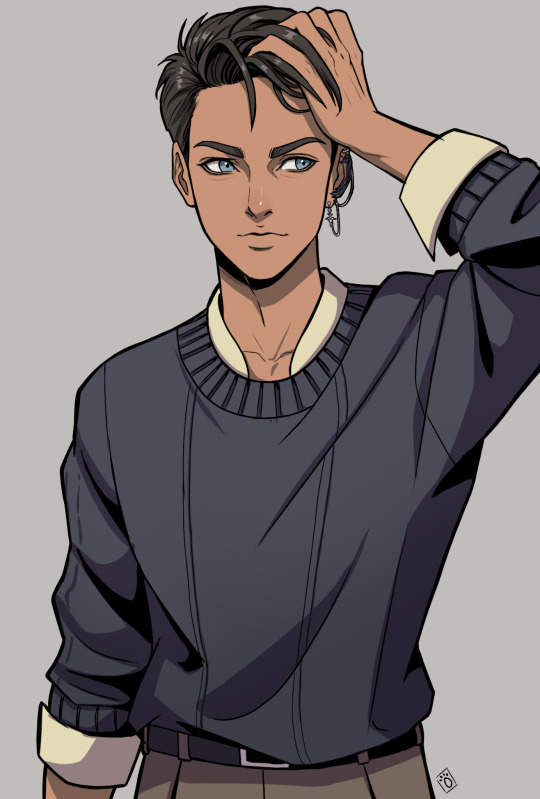

My Créme de la Créme MCs -- Ethan & Celeste Dalton
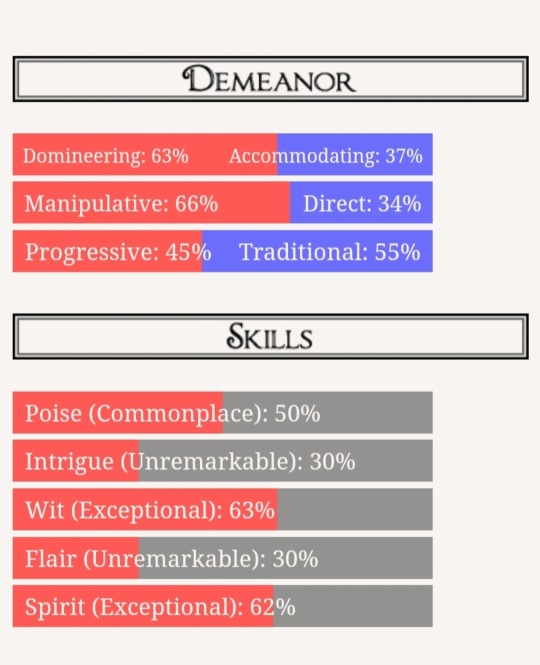

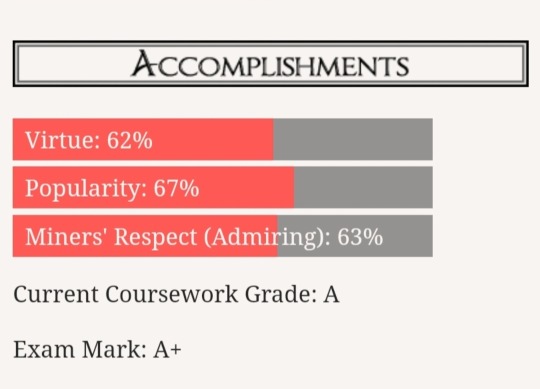


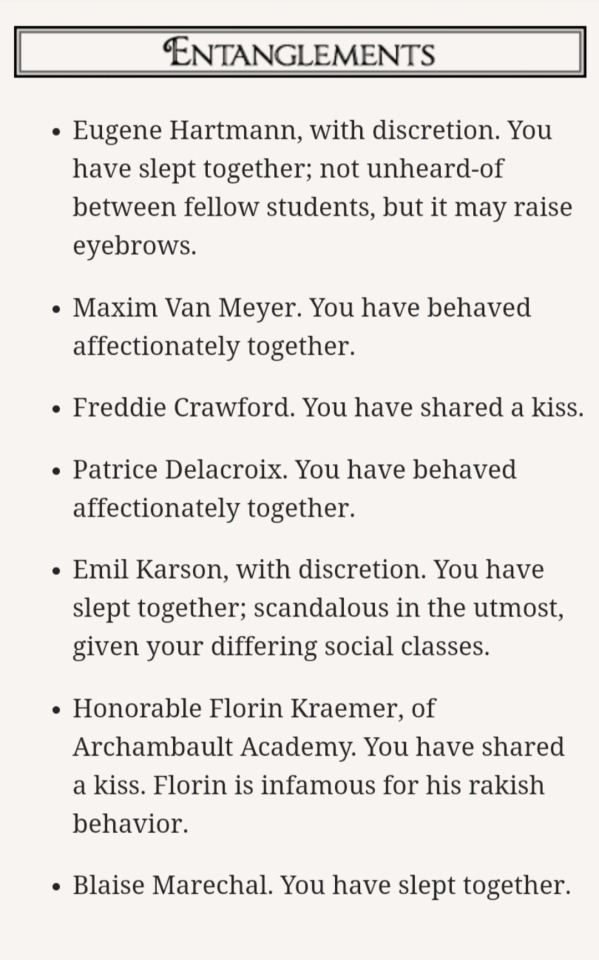
I played CLDC by @hpowellsmith and enjoyed it quite a bit, so I got a commission of my MCs from OyenPaws on IG <3
Spotify playlists:
More info under the cut!
Ethan Dalton and Celeste Dalton are siblings. However, they're total polar opposites. Celeste is bubbly, outgoing, flirty and dramatic. Meanwhile, Ethan is introverted, reclusive, quiet and stoic.
I added lots and lots of headcanons (sorry), so in my mind, their playthroughs happened parallel with each other.
Ethan is very academic and studious. He stays in his own lane, does his own thing, unbothered. Celeste is popular and is involved with everything and everyone. She's a flirt, for sure. Florin Kraemer, eat your heart out.
Ethan decided to pursue higher education at a prestigious university, while Celeste decided to have fun with an art gallery apprenticeship. Her end goal is to become a fashion designer and start her own haute couture house.
In both playthroughs, Gallatin won. None of them ended up married. Lady Renaldt got exposed, and the good Dalton family name was restored.
Ethan got thrown in the mines (yikes!) while Celeste was busy fooling around with her boytoys. You'd think that she'd notice her brother being gone, but it's kind of hard when there are so many guys fighting for your attention :/
I scoured the author's blog to find any clues about the fashion in CLDC. I didn't want to put them in their school uniforms (which would've just been easier honestly), and since the zeitgeist of the CLDC universe is actually... not THAT set in stone (I even looked at other people's MC to make sense of what the fashion should look like) I just ended up taking inspo from dark/light academia, old money and coquette aesthetics. Can you tell that Celeste is very Lana Del Rey coded? :)
Their parents accidentally supported a corrupt political candidate.
Celeste is incredibly arrogant, vain and bold. For better or for worse. Ethan also has a tendency to look down on people he deems to be less intellectual than him.
Celeste had a hate-love thing with Blaise. Ethan wondered why she needed two snarky dark-haired dudes in her life. He pretty much avoided everyone, and the closest thing he had to romance was with Prince Rosario of all people!? So much for trying to be low-profile.
Ethan has to constantly drag Celeste out of dumb situations of her own making. Celeste has to constantly remind Ethan that people, even him, need human interaction.
Honestly the only reason why they managed to save the family's reputation is because Ethan was working behind the scenes and cleaned up Celeste's love scandals.
They're part east/southeast asian, part middle eastern and part european.
Ethan loves birds, especially corvids. He spends more time with birds than he does with people. His earring is supposed to resemble a raven.
Celeste is part of the Prefect Committee. Ethan is a member of the Birchmeier Society.
Ethan is 5'11, Celeste is 5'5.
Their mom is another OC of mine, Darcy Angelis <3
Had to restart the playthrough because of this, but in Celeste's playthrough, she decided to dance with Auguste at the ball. After that chapter ended, it triggered multiple consecutive scenes, one after another, where literally ALL of the characters had the "what are we???" talk with her. Can't believe the harem found out.
36 notes
·
View notes
Text
This is bringing back my ‘observer only’ memory of the zeitgeist discoursing over Rhaenyra casting (like I watched some random dude’s entire catalog of figuring out who was playing everyone) but in my opinion Milly Alcock looks a bit more like she’d fucking kill you and Emma D’arcy’s mean face makes me want to give them a hug.
Milly Alcock looks like she could open her mouth to sharp teeth at any moment. They are both simultaneously too beautiful and not conventionally attractive enough for everyone to be happy. Emma D’arcy does wear grief and devastation very well. I think it was good casting all in all because nobody shut up about it but only losers complained a la “Darcy isn’t hot enough!!” which is just boring.
#a.personal#I could say smth problematic and possibly#un-pc but I will restrain myself#Darcy has more Rang imo#in the character I haven’t seen#either of them stuff otherwise#I could barely sit thru hotd and that had dragons#and I was just trying to b Cool and Hip and with it
7 notes
·
View notes
Text
“I Am YEG Arts” Series: Sharon Rose Kootenay & Jason Symington

Jason Symington (left) and Sharon Rose Kootenay (right). Photos by Jason Symington.
If the two fit, collaborate? For Sharon Rose Kootenay and Jason Symington, it was never a conundrum. Outstanding artists in their own rights, this duo’s collaborative practice is a natural extension of their friendship and respect for one another’s creative practices. Centred on the extensive conversations they have about life, death, love, and art, their public artwork references both Kootenay’s traditional Métis-Cree teachings and Symington’s exploration of visual rhetoric and the zeitgeist.
Friends, artistic collaborators, and seekers at heart—this week’s “I Am YEG Arts” story belongs to Sharon Rose Kootenay and Jason Symington.
How did you first become involved in working with each other? And why do you think the partnership works?
J.S.: We met a few years ago in a photography class I was teaching. After class, Sharon and I would have long discussions about art, photography, and everything else. When we collaborate, we discuss the concept, design, feeling, audience, etc., and there is always a healthy back and forth. I think the success of our partnership stems from these chats. We both like to talk, but we are also excellent listeners, so it’s like the chats have never ended.
S.R.K.: As Jason mentioned, he was my photography instructor… but what he didn’t say was that I was utterly hopeless at it! Of course, the best part of the class was meeting Jason, so we remained very close friends and eventually began an artistic collaboration that brought our strengths into a cohesive and rewarding public-art practice. I think our partnership works because of our friendship—it’s built on the love and respect we have for each other. We are both seekers at heart, striving to communicate, to gain deeper understanding, and to speak as artists.
What themes are you drawn to in your work together? And how do they represent your sensibilities and strengths as storytellers?
S.R.K: I would say that the recurring themes in our work are those of redemption, compassion, and mysticism communicated in ways that are recognizable and only slightly beyond reach. There is a sense of otherworldliness that is expressed through our collaboration that reflects our discussions on spirituality, childhood memories, and land-based experiences.
Tell us about someone who’s mentored you or helped set you on your path.
J.S.: There are a few people I could mention here. But I think going back to the beginning of my art career is where I developed the most as an artist. A special thanks go out to Darci Mallon and Cherie Moses. In very different ways, these fantastic artists/instructors directed me to become the artist I am and are still in my head, making me accountable for my work.
S.R.K.: My maternal grandmother, Flora Lambert, was instrumental in helping me to develop a sense of being, as both a young mother and a fine-craft artist. Flora was a talented, nurturing, and generous maker, spending her time creating gifts for those she loved. She set a wonderful example for me, encouraging me to make art and to stay true to our Métis heritage and family values.
What’s one piece of advice someone gave you growing up that turned out to be true. What’s one piece that didn’t hold up?
J.S.: Gary Neil Kennedy, in a one-on-one during my undergrad at NSCAD, told me I needed to understand my work from both sides: my side and the viewer’s side. It's been the way I’ve looked at my work ever since. I can’t say that I remember a piece of advice that hasn’t held up. I mean, there has been advice that wasn’t good. You just hope you recognize it before it goes bad.
S.R.K: Years ago, I took a Myers-Briggs Indicator Personality Type Test. The results left me with only two occupational choices: librarian or artist. Luckily for me, I followed both these career paths and found a lot of satisfaction in each of them. Coincidentally, Myers-Briggs is based on Jungian psychology, which has remained compelling and continues to inform my artistic practice to this day. The only advice I recall that hasn’t held up was someone telling me that I needed to stop being interested in so many things!


Nipiyesiw // My Thunderbird (top) and Kaskitewastim // Dark Horse (bottom) by Sharon Rose Kootenay and Jason Symington. Photos provided by the artists.
What does community mean to you, and where do you find it?
J.S.: Community is essential. It gives you support to create when the world around you might not know what it is you are trying to accomplish. I have been fortunate to have a readymade community through teaching. I am surrounded by practicing artists across multiple disciplines and by engaged students who want to challenge the system. Partnering with Sharon is also a wild ride, as she knows everyone.
S.R.K.: The Edmonton arts community is wonderfully vibrant, offering a constant source of creative ideas, kindred spirits, and fun events filled with amazing works of art, literature, and music! I am always happy to be amongst fellow artists and those working within the arts sector. This is the community where I thrive, and I appreciate it so much!
What is it about public art that inspires you not only to create it but to champion it?
J.S.: The connection to the audience. Public art is essential because it engages people in their environment. Look at Anish Kapoor’s Cloud Gate, Louise Bourgeois’ Maman, Tino Sehgals’ Special Project Art City, or Jean-Paul Riopelle’s La Joute. These works don’t just engage with the people who live near them, they engage with people from around the world.
S.R.K.: Through ongoing conversations with Jason, I was able to understand and connect more fully to the practice of public art. Creating a dialogue with Jason that ripples out to an audience inspires me and holds great appeal. It’s the ongoing conversation and feedback that becomes the important thing, especially in the age of social media.
When you’re taking a break from a project, what will we likely find you doing?
J.S.: I don’t do very well taking breaks. If Sharon and I aren’t working on a project together, I am working on personal projects, photography, screenplays, and documentaries. If I am not working, I watch films and hang out with my family.
S.R.K.: As a beadworker, I thrive on a creative, daily routine that keeps me calm and centred. Because beading is such a slow-stitch craft, some of this daily work becomes part of the visual catalog that Jason and I will draw from for our collaborative projects. I also enjoy visiting with friends, live music, reading, and gardening.

Transformation: Promise & Wisdom by Sharon Rose Kootenay and Jason Symington at the 2021 Works Art & Design Festival. Photo by the Edmonton Downtown Business Association.
Tell us a little about what you’re currently working on together or hoping to explore next.
We are currently working on a larger mobile public artwork that continues our exploration of representation, and the “other.”
Describe your perfect day in Edmonton. How do you spend it?
J.S.: It would be a day in late July or early August. Hot, but not crazy hot. I would casually kayak down the North Saskatchewan River with my family and friends. Seeing Edmonton from the North Saskatchewan River is something not many people do, and it is impressive.
S.R.K.: I would also be on the move—driving my car through the city with family or friends riding shotgun—down Groat Road, across Dawson Bridge, touring through old neighbourhoods and places of connection. Windows down and singing along to a vintage playlist!
What excites you most about the YEG arts scene right now?
J.S.: Potential. I think the YEG arts scene keeps getting more robust due to the potential of the artists working in and around Edmonton. It is also great to see the growing variety of mediums exhibited in the city, and kudos to the people making things happen here.
S.R.K.: I am quite excited by the new work being created by young Indigenous artists of all genres. As a senior artist and long-time Edmontonian, it’s been a wonderful thing to witness the evolution and presentation of Indigenous art forms, from the late 1970’s to the present day.
Want more YEG Arts Stories? We’ll be sharing them here all year and on social media using the hashtag #IamYegArts. Follow along! Click here to learn more about Sharon Rose Kootenay and here for more info about Jason Symington.
About Sharon Rose Kootenay & Jason Symington
As a Métis-Cree artist, Sharon is inspired by traditional Native women’s creative practices, her grandmother, Flora, and her sisters, as well as historical and contemporary artists. Sharon’s beadwork transcends boundaries and references traditional teachings, the Female Gaze, and the transmission of cultural lifeways. The designs Sharon creates speak to the spiritual realm, the current socio-political climate, and environmental issues. Her work demonstrates the authentic cultural perspective of constructing an open and honest dialogue with the viewer to foster a greater understanding and appreciation for all peoples.
Jason is a conceptual artist who uses visual rhetoric to engage his audience. He incorporates theory, concept, and various media to create his messaging. Theories of alienation, identity, sexuality, and the “other” play dominant roles in Jason’s work. The media vehicles (stills, motion, audio, etc.) delivering his messaging operate through the codes and conventions of the zeitgeist. The goal of Jason’s work is to interpolate his audience to gain greater insight into the “other.”
Sharon and Jason’s collaborative practice is an extension of their friendship and respect for each other’s creative practice. The collaborations centre on the extensive conversations the duo has about life, death, love, and art.
0 notes
Quote
al mattino il marito della Ferragni ci ha spiegato quanto siamo scemi a scrivere di lui e di sua moglie come avessero il dovere di capirci qualcosa: mica sono politici, loro; e al pomeriggio ha organizzato una diretta Instagram, con ospiti Alessandro Zan, Giuseppe Civati, e Marco Cappato (che in confronto al resto dei convenuti pareva Churchill).
La moglie era a Cannes, e in diretta scriveva nei commenti, lasciava bandierine arcobaleno o compitava solleciti «ciao amore».
(...) I presenti, consapevoli d’aver davanti uno con gli strumenti culturali d’un ripetente di seconda media, col quale è tuttavia bene essere ossequiosi per non alienarsi i dodici milioni e fischia di follower (trentamila che seguono la diretta, e dodici milioni che senz’altro la recupereranno successivamente), fanno dei giri di parole per non dirgli di ripresentarsi quando avrà studiato.(...)
Il marito della Ferragni dice che è scandaloso il voto segreto, l’elettore ha diritto di sapere, e Civati aspetta mezz’ora prima di illustrargli il concetto di libertà di coscienza con parole così semplici che secondo me sta pensando «Ti faccio un disegnino». (...)
Il personal branding ti vuole sostenitore di buone cause, mica informato sulle stesse: se non è Zeitgeist questo (mi permetto di dire «Zeitgeist» perché ho meno pubblico della famiglia Ferragni: quando ti rivolgi alla nicchia a volte puoi osare persino un quadrisillabo bisdrucciolo). (...)
È la diretta del vale tutto, è evidente quando Zan dice «bisogna aiutare questi bambini nel loro percorso di transizione», e lì non c’è non dico uno psichiatra ma anche solo uno che abbia letto mezzo testo sul tema e sappia che la maggior parte delle disforie infantili si risolve senza alcun bisogno di transizione. (...)
Meno male che Cappato c’è, e prova a spiegare che la testa della gente non si cambia a botte di codice penale (...).
Poco dopo arriva Civati e dice «se una cosa è giusta e la fanno altri paesi europei», ed evidentemente i suoi genitori non gli hanno mai spiegato che a loro non importava di cosa facessero gli altri bambini, gli è rimasta la smania di emulare gli altri. (...)
Il marito della Ferragni dice che viviamo in «uno scenario distopico», e invoca «l’opportunità di essere un pochino al passo coi tempi, di non essere anacronistici», e non sta ipotizzando un paese in cui i gay possano adottare o i paralitici possano trovar liberi i marciapiedi (ci sarebbe anche l’abilismo, nella Zan, ma va meno di moda parlarne).
Sta parlando solo di darci il permesso di dirci maschi seppur con molte tette, ovvero di tutelare l’identità di genere, quella cosa che lui crede sia «maschile, femminile». Va tutto bene. «Siamo ai primi di luglio e già il pensiero è entrato in moratoria. Drammi non se ne vedono, se mai disfunzioni», scriveva cinquanta estati fa Montale, che persino a casa Ferragni avranno avuto nei testi delle medie. (...)
Intanto, sotto, passano i commenti del paese reale che sta guardando la diretta che ci renderà un paese migliore: «Ciao Fede mi saluti?».
Guia Soncini percula la diretta instagram di FEDEZ. Manca solo un NON DATE DA MANGIARE AGLI ANIMALI.
Frega un cazzo dei due ripetenti braccia rubate ai lavori che nessuno vuol più fare, questo è un autogol dell’intellighentsia sinistra ossequiosa dei due influencer. Ricorda tantissimo il povero Bersani davanti al Sinedrio delle scimmie m5s ai tempi delle sue elezioni perdenti. E’ la conferma ma che dico dell’arretramento, della EVAPORAZIONE CULTURALE DEL SINISTRISMO.
via https://www.dagospia.com/rubrica-29/cronache/ldquo-mi-viene-mente-berlusconi-sua-saggia-convinzione-che-276047.htm
Un solo PS non da ridere sul cane bastardo che si permette di dire: «bisogna aiutare questi bambini nel loro percorso di transizione». Il vero TARGET di codesti sono I VOSTRI BAMBINI. DA SEMPRE.
33 notes
·
View notes
Text
7 Comfort Movies
Okie so as I’ve been tagged by @lastcallatrockysbar and @theychosefamily and @eyes-of-a-disney-princess, I should probably stop procrastinating and do this lol
1. Hello, Dolly!
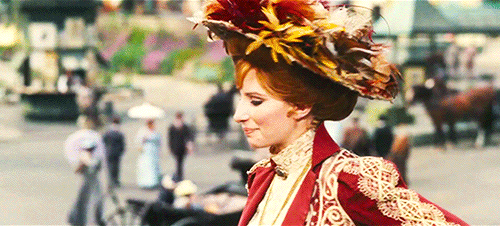
This role wasn’t written for Barbara Streisand, but it was soooo written for Barbara Streisand. She is the quintessential Dolly, and every second of this film, from costumes to sets to cinematography to acting, was spot-on. Plus, Louis Armstrong!
2. Lord of the Rings (trilogy)

This counts as one film, yes it does. And we’re talking the extended editions, so it’s one 9-hour long marathon film. I put this on in the morning and watch it all day and I’m happy. And depending on the day, I’ll watch the whole thing with commentary, because the commentary tracks are literally the best thing ever.
3. The Duff

There is nothing I don’t like about this movie. It’s fun, it’s awkward, Mae Whitman is a dryly sarcastic genius, and Robbie Amell is both hotter than the sun AND super funny. The movie took lots of liberties, but I actually like it better than the book. The book was dark and kinda mean and depressing, with a sort of ambiguous ending...the movie is pure wry fluff. Plus, Allison Janney!
4. High Society
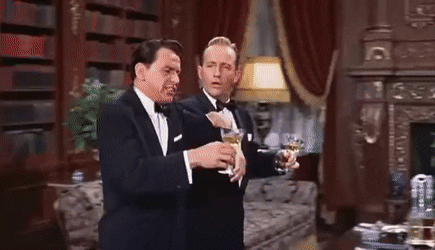
My favorite Golden Age Hollywood film. Grace Kelly’s final performance! Celeste Holm, everyone’s favorite Character Actress, being snarky and perfect! Music by Cole Porter! Costumes by Helen Rose! Bing Crosby and Frank Sinatra do a duet about how much they fucking hate parties! Plus, MOAR Louis Armstrong!
5. If the Shoe Fits
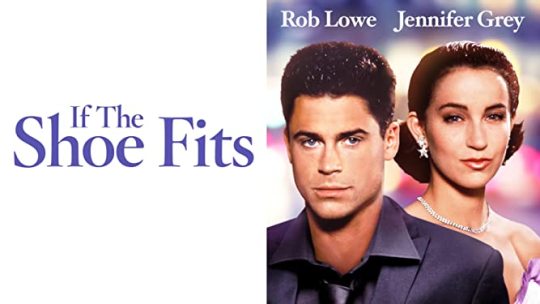
This movie is apparently so obscure nobody’s made a gif of it?? Which is a TRAVESTY because it’s SO GOOD! Rob Lowe and Jennifer Grey in a suuuuper 80′s retelling of Cinderella set in France. This movie has everything: eye-searing 80s fashion, a ditzy Fairy Godmother who wears guitar-shaped sunglasses, two terrible French aspiring-model roommates-cum-stepsisters... and at one point, Rob Lowe hiding under his desk in a silk robe picking at the carpet whilst his entourage watches like this 😬😬😬
6. Pride & Prejudice 1995

Yes I know it’s technically a mini-series, but I don’t care. And I know some of you young ‘uns are all like oh but what about the the emo Keira Knightley version where nobody’s hair is ever curled correctly and everything’s dirty and Darcy confesses his love in the rain? NO. That is a garbage adaptation and a disgrace to its name and I WILL NOT STAND FOR IT. 2005 Lizzy Bennet twirling forlornly around on a swing whilst sad music plays in the background, are you fucking kidding me?? Austen is spinning in her grave! AUSTEN INVENTED THE ROMANTIC COMEDY, GOTDAMMIT! AUSTEN IS FUNNY! AUSTEN IS WRY! AUSTEN IS HAPPY! The woman never took anything seriously in her entire life, and then these grimdark motherfuckers go and vomit their Wuthering Heights aesthetic™ all over her masterpiece and...Okay, you know what? *deep breath* Never mind. This is the good adaptation. Watch this. Laugh. Ogle Colin Firth in a wet linen shirt. Enjoy.
7. The Princess Bride

This film is a literal masterpiece. Every single line is quotable. Every character is memorable. It never gets less funny, or less moving, no matter how many times you watch it, which is INCONCEIVABLE! It’s a stunning achievement, a modern story that has taken its place in the zeitgeist alongside classic fairy tales like Cinderella. Also, is the perfect movie to play when you’re sick; then you can pretend you’re baby!Fred Savage, and it’s your grandpa reading you a story!
tagging @paris-aflame @ja9toextremes @kayleighhalliday2203 @star-spangled-man-with-a-plan @captain-rogers-beard @absentlyabbie @miricastor and whoever hasn’t done it yet.
#7 comfort movies#hello dolly!#LOTR#The Duff#High Society#If the Shoe Fits#Pride & Prejudice 1995#The Princess Bride#stitch watches the cinema#cowgirl and sammit and punzel and stitch#long post for ts
37 notes
·
View notes
Note
I asked you about the outlining. Thank you so much. I was having some serious issues with the middle portion. Because I have a chapter after the climax which isn't an epilogue. Would you recommend that? And then there is an age gap and a narrator switch. The middle is proving to be such a hard process, how do you usually tackle it? Also if my characters have interests/hobby is it okay if I don't being them up all the time to prove a point? What about side roles? I'm really inexperienced. Sorry.
Midpoint
So, lots of people more qualified than me have written lots of great stuff about the midpoints of stories. I’d rec googling it so you can see some of their words. There’s even a craft book called Write Your Novel from the Middle (I haven’t read it). Here’s a quick recap of what’s stuck in my head on the subject, which is gleaned from three-act structure, Save the Cat, and the brain of @lol-zeitgeistic.
Stories we love involve two arcs: the plot (something happens! character needs to respond! how will they manage to prevail! a climax! the hero succeeds!) and the inner character growth (the character starts the story flawed in some way and doesn’t understand the real lesson they need to learn, by the end of the book they’ve figured out the lesson and putting it into practice is what allows them to tie up the plot). So the plot arc is like: they kill the bad guy in the end! And the inner character arc is like: the character needs to believe in themself, and overcoming that insecurity is what allows them to kill the bad guy.
So the midpoint is a plot point (i.e. Something Happens™️), but what keeps the story from sagging is really the fact that it is a time when the character pivots in some way in their inner growth.
Here are some things that happen in midpoints:
The character stops reacting to external events (passive) and starts acting (active)
The character starts the process of learning the ultimate lesson they need to learn—they don’t finish this, but they start it
Often some kind of character realization about themself (”oh shit. I’m in love!”)
Plotwise, often a false victory (the character is like aha! I won! but spoiler alert: nope) or a false defeat (the character is like noooooo I lost! but spoiler alert: nope) that increases the opposition
Often love interests get together or something happens about their relationship (not always—this really depends on the plot, if it’s a romance plot they can get together at a number of different plot points)
The stakes are raised (is some kind of deadline imposed? Do they learn some awful thing about the bad guy they didn’t realize before?)
A midpoint reversal: the character thinks they know what to do to win, and a plot twist shows that they’re wrong, that won’t work after all, and they need a new plan
What this means is that the first half of the book has one feel, then the midpoint happens, and the second half has a different feel. That’s why sometimes people talk about the midpoint like a hinge, because it alters the feel.
Examples of some famous midpoints:
Mr. Darcy proposes to Lizzy and she turns him down flat
In the Matrix, Neo visits the Oracle and learns he’s not the One
Harry learns the truth about the sorcerer’s stone and vows to protect it from Voldemort
Katniss is stung by a tracker jacker and Peeta saves her—she realizes she can’t kill him. She realizes securing only her own survival isn’t an option she can live with
In my Jeddy multiverse fic, it’s where Teddy tries to kiss James, is rejected, and gets sent back to his universe
In Hag Hex my outline says this for the midpoint: D realises he's in love with H, from here on out he's not being strategic anymore, no more "Potter", maybe he walks away from Harry when he realises it's happening? D is now acting against his interest
What this does for your story is give it new energy—the thing that happens at the midpoint and the character’s reaction to it basically launch them into the second half of the book.
If you haven’t spent time thinking about what will happen there, writing the middle can feel impossibly slow—like you are supposed to just keep writing more of the same? ahhhhh
I hope this is helpful! I will try to address your other questions in a different post later.
14 notes
·
View notes
Photo

Pride and Prejudice: Eine gelungene Adaption
Pride and Prejudice (2005) ist eine Verfilmung von Jane Austens gleichnamigem Buch aus 1813. Die selbstbewusste und emanzipierte Elisabeth Bennet (Keira Knightley) denkt gar nicht daran zu heiraten – besonders nicht, wenn keine Liebe involviert ist. Dies passt Elisabeths Mutter überhaupt nicht, ist das Heiratsthema doch von großer Bedeutung für sie. Denn: Stürbe der Familienvater, würden die fünf Töchter ihr Erbe und den größten Teil ihres Vermögens an den männlichen Erben, den unliebsamen Cousin Mr. Collins verlieren. Die Heirat mit besagtem Erben lehnt Elisabeth jedoch vehement ab. Ihre ältere Schwester hat mehr Glück: Sie verliebt sich in den liebenswürdigen Mr. Bingley. Dessen verschlossener Freund, Mr. Darcy (Matthew McFadyen), ist Elisabeth jedoch vollkommen unsympathisch. Dennoch scheinen sich die beiden aufgrund ihrer Gegensätze zu faszinieren.
Buchklassiker zu verfilmen ist häufig ein kompliziertes Unterfangen und geht noch häufiger schief. Regisseur Joe Wright produziert mit seiner Verfilmung jedoch eine Adaption, die wahrscheinlich auch Jane Austen selbst gefallen hätte. Keira Knightley überzeugt vollkommen mit Witz und Charme und auch Matthew McFadyen ist eine ideale Besetzung des introvertierten und verkannten Mr. Darcy. Die –zu recht- mit einem Oscar nominierte Filmmusik und Kostümierung schaffen es, den Zeitgeist des 18. Jahrhunderts aufs Genauste zu treffen. Die versteckte Emotionalität und Zuneigung der beiden Hauptfiguren, die durch leise Blicke und Gesten zum Vorschein kommt, zeichnet die Verfilmung ganz besonders aus. Die Chemie der Schauspieler ist glaubhaft und das Schauspiel der beiden großartig und herzergreifend. Auch optisch ist der Film eine Augenweide: die wunderschönen Bildkompositionen und Lichtsetzungen des Films wirken natürlich und berauschend zugleich.
★ ★ ★ ★ ★
Ivana
2 notes
·
View notes
Text
Perpetua: A Potential Heroine for our times.

Hi everyone we are going to rant about the Bridget Jones series once again and talk about a character, who I feel came too early before our current zeitgeist of bad bitch feminism and the #GirlBoss: Perpetua.
Perpetua is not intended to be likable. She is very posh, snooty, a bit arrogant, and demanding of Bridget and people she works with, greeting Bridget with a slight sneer as she comes into work and Bridget’s inner monologue voices a desire to staple stuff to her head for having gained a bit of power over Bridget in the publishing company Pemberley Press. Gee, let’s see what we have: entitled, snooty, fancy, having the attitude they are above it all, who has those traits? I’ll wait *sipping tea*

But we notice something about Perpetua; after Bridget’s relationship with Daniel implodes because he was using her as his side piece and decides to find a better job elsewhere, Bridget goes to Daniel to tell him she is quitting. Perpetua overhears and picks up on what has been going on (she is appalled at what she is hearing) and as soon as Daniel tries to beg Bridget to stay, Perpetua gets up to defend Bridget: “I want to hear this, because if she gives one inch, I’m going to fire her bony arse for being totally spineless!” To her smiling pride, she sees Bridget tell Daniel off and leave the publishing company...and that’s the last we see of Perpetua. Even after that (awesome) scene, my teenage self got the message that it’s better to be a Bridget over a Perpetua, a bubbly but insecure girl who tries to conform to the male gaze over a stoic and IDGAF woman who does what she wants. I also heard messages from people, like my parents, telling me how important it was to act and look a certain way to be “likable”; it was better to be insecure and conventionally feminine rather than to be confident not very popular but self-assured. Also Bridget was the rom-com heroine who had people fall in love with her, Perpetua was seen as stuck-up and she was thrown to the wayside. Who stood to reap the benefits of our society?
Looking back, I found out that after almost 20 years of trying to be a Bridget: the “relatable” insecure girl next door type who is vulnerable and needs the validation of those to find her desirable and “worth it” that I’m wasn’t the likable, conventionally pretty and feminine Bridget...I was Perpetua: not always likable, assertive, willing to put her neck out there, not always sociable, but assured of her intelligence and her ability to turn heads. Plus we have our signature style and know how to work accessories. While Bridget dresses basic and in miniskirts (she wants to blend in but also attract men), Perpetua stands out in her headbands, pearls, cardigans, and pie-crust collars combining the elements that I loved in a younger Hillary Rodham Clinton, Peggy Olson, Nancy Wheeler, and Raquel Rodriguez Orozco from Destinos: An Introduction to Spanish. Just a Power Preppie who figured out how to stick out and take her place in a male-dominated workplace, with no apologies.
After watching Tee Noir’s video on women who were declared to be problematic but upon second viewing and reading were raising valid points about their situation or the situations they observed but lacked the likability or popularity to be taken seriously, I was inspired to finally write this post. As Perpetua was a woman who showcased what it was like to live life on your terms and not ask for the permission of anyone to validate you. A woman who may have envied Bridget’s “bony arse” but didn’t let her size or peoples’ perceptions of her appearance get in the way of getting what she wanted from others.
undefined
youtube
Here are some tropes and issues I will be referring to in this order, as they relate to Perpetua’s role in the films and books and how they regard her.
Fatphobia: Being Targeted by Internalized Hatred
“Ah. Introduce people with thoughtful details. Perpetua, this is Mark Darcy. Mark is a prematurely middle-aged prick with a cruel raced ex-wife. Perpetua is a fat-ass old bag who spends her time bossing me around.” Bridget Jones’s inner monologue, Bridget Jones’s Diary (2001)
We all know that Bridget Jones is notoriously famous for obsessing over her weight (134 lbs. at 5′4″, which is pretty fine) and that there have been reviews of the books and the movies condemning her or passive-aggressively noting that she isn’t Hollywood Thin and how it was remarkable for she (with hourglass curves, wears a small to medium size, blonde and blue eyed, average pretty at her worst) to get Colin Firth and Hugh Grant (in their prime) to fight over her. Whether we go by the timeline of the books (her birth year being 1962, Marilyn Monroe’s death) or the movies (her birth year being 1969 in the first film, post Jayne Mansfield), we see that Bridget grew up in and became an adult in an age where the female standard of beauty had gotten thinner and thinner, with even models having their pores air-brushed away from their faces. To paraphrase a Mad Men fan when she was talking about the culture of the mid-1960s, when she was a kid and women wanted to look curvaceous as Marilyn and Elizabeth Taylor, she looked like Twiggy; when she developed the voluptuous curves, everyone wanted to look like Twiggy. The 1970s and 1980s was an age of self-improvement as female empowerment (feminism co-opted by capitalism) where dieting and getting thinner was seen as “bettering” oneself. Suddenly it wasn’t cool for Bridget to strut her stuff in a pencil skirt a la Joan Holloway, it wasn’t enough to be a junior partner or to create your own safety net, even the irresistible Veronica Lodge worried about her weight.
*WARNING: Most of my sources refer to Fat Black Women but I feel like the arguments hold up here*
Then we go to Bridget and Perpetua, aside from their personality clash, Bridget is secretly envious and outwardly disgusted by how Perpetua can be much heavier than Bridget, yet wear curve-hugging clothes and go shopping and not give a shit about how her body looked. Perpetua knows that her boyfriend appreciates her good pussy under her gut! Bridget comforts herself by telling herself that happiness comes from reaching attainable goals....like changing one’s body rather than making money or procuring items....sigh Capitalism is a son of a gun. Clearly Bridget has animosity towards Perpetua for being plump and not feeling like she needs to hide for not looking like a supermodel. But why?
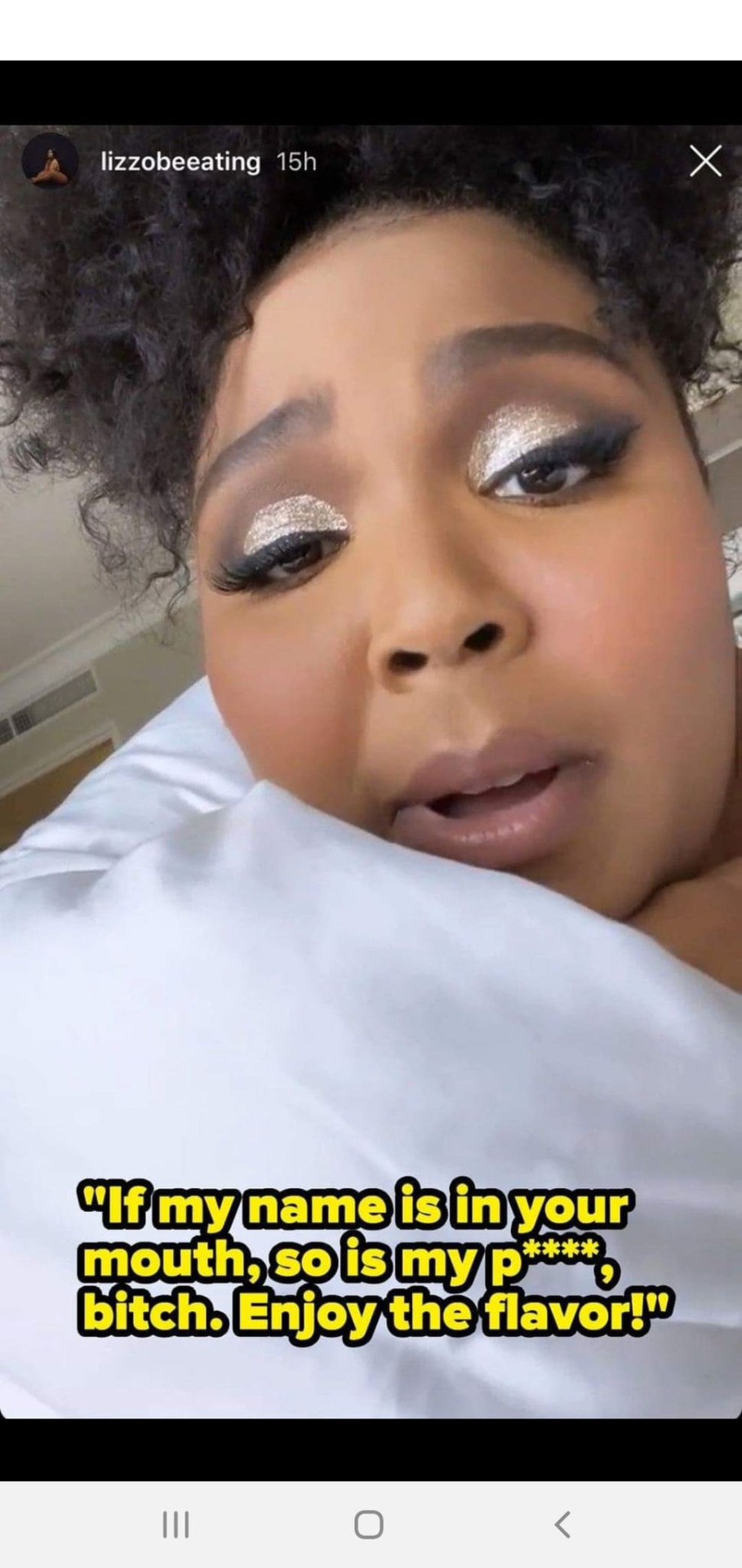
Fatphobia is one way of expressing internalized hatred against one’s body and their own self. In fact, Perpetua committed the sin of loving herself (or being neutral to oneself) as she is, and stands out from the rest of the cast who are obsessed with living up to certain standards to putting forward a certain image to the world that everything is fine. In a fatphobic capitalist patriarchy, it’s quite maddening that she would develop the arrogance and entitlement that she puts on display, especially because she is a...woman! Katie Wee, in her essay for Huffington Post, talked about how it was hard for her to play a fat-shaming exercise instructor in an episode of Shrill because she wouldn’t fat shame another person, but she had practice internalizing that cruelty. Wee talks about her history of eating disorders and over-exercising, all in a bid to become a ballerina, well into her twenties. Currently she works at a body-inclusive fitness studio and that Lindy West and Aidy Bryant were very encouraging in her performance. She also said:
When Annie writes her off, I made the decision that for Tanya this hits something much deeper. It’s as if Annie is saying Tanya’s life’s work is for nothing, or her religion is bullshit. Annie is feeling content in the body she is in, and for Tanya this feels like a personal attack. The subtext to what Tanya is saying is, “If I don’t get to be happy in my body, neither do you! Especially not you.”
This was also explored in the Room 104 episode “The Hikers” where college graduates and childhood best friends go on a hiking trip before they start working or looking for work. Megan (the fabulous Shannon Purser) is plump, freckled, down to earth and happy to have gotten a job offer right after she accepted her degree while her friend Casey (Kendra Carelli) is thin, has excelled on Instagram artifice, and hasn’t procured her own job yet but is triumphant over her past popularity. Yet a placed pebble in Megan’s boot reveals that Casey has been feeling disgust over how her fat friend would thrive in a larger body and not cover up and how she was burdened with making sure she was included in social gatherings growing up, soon Casey’s angry rant after Megan voiced her disgust over Casey’s sense of superiority over her reveals that Casey is angry that being conventionally beautiful and popular hasn’t made her any happier with herself or her own life, while Megan has excelled in their young adulthood in spite of her appearance and lack of popularity. Bridget is angry that Perpetua is thriving and content with her own life despite not looking a certain way while Bridget has been trying to get down to 110 lbs since she was a teenager and has been backing out of rooms after getting laid so the menfolk wouldn’t notice her behind isn’t scrawny (what would she think of Kim Kardashian’s or Nicki Minaj’s behinds?). Bridget, who poured energy into fitting an ideal of an adult woman, is miserable while Perpetua, who isn’t the “ideal woman”, is successful.
There is also some egocentrism on Bridget’s part: she is a heroine of a rom com so the story centers on her, with her friends being mere satellites. There has been a tradition of the fat best friend who exists to support the leading lady or gent who will fall in love while the fat person gets to sass and serve as cheerleader, with no insight on their inner life. Especially if they are Black. Tee Noir noted that most of the funny fat friends tend to be more engaging and likable or just plain compelling than the conventionally attractive main character, but their characterization is often neglected, to the point of sometimes even lacking a last name. In fact society, and even fat people, are internalized towards thinking that if you don’t fit the standard of desirability (thin, white, young-ish, cis, wealthy), you have to settle for less in your relationships and in entitlements, like how Annie in Shrill goes out with a boy who is too mediocre for her, all because she got the message that a fat girl like her shouldn’t expect a hunk or even a guy who is going to treat her decently and see her as a goddess. The show centered on Annie bringing out her inner fat bitch. Bridget hears constantly from her smug married male pals that women of a certain age shouldn’t be too picky because they aren’t as attractive and fertile as younger women (ring, ring, I am calling Tarana Burke on their asses, can I be the hype man?) and that triggers her insecurities about being single and 130 something pounds. Perpetua, who is a bit older than Bridget, medically overweight, single (but with a boyfriend) and less conventionally attractive than her...and is thriving in her life with no rush to the altar and she is free to voice demands in her relationship. I guess Bridget isn’t as nice as we were supposed to think she is, no shade, but be upfront about it Bridget (or writers).
But I can go easy on our hapless blonde, because Bridget (and probably Perpetua) internalized the notion that fat is disgusting and that women who aren’t thin enough have to shrink themselves and blend in, not causing waves. Perpetua lets us in on some hints that perhaps she is jealous of Bridget’s looks and figure, referring to her as having a “bony arse” for one, but it’s not a driving trait of her character. In her seminal book on female Baby Boom pop culture history, Where the Girls Are: Growing Up Female with the Mass Media, she noted that from a young age women were encouraged to see other women as competition, and if one woman is victorious in one area, we are defeated “And we had grown up with a notion of a female hierarchy in which some women---the Waspy, wealthy, young, and beautiful---were at the top of the pyramid and other women---the poor, the dark-skinned, the ugly, the old, the fat---were at the bottom and this is something that advertising (a source that sells Perpetua her image of wealth and sells Bridget’s insecurities) capitalizes on. Media in the 1970s have even applied the same dichotomy to some feminists where Germaine Greer (before she was all TERFy) and Gloria Steinem were held up as exceptions to the stereotype of ugly, nagging, and/or mannish feminists (something that Betty Freidan, Kate Millet, and the OG Bella Abzug got slapped with). It’s the ugly side affect of individualism.
One can hope that Bridget got the shameless and joyful spirit of that little girl who ran around the paddling pool in her underwear back.
Who’s Afraid of “Fat ass old bags”?: Backlash against non-insecure women
“Do what you feel in your heart to be right – for you'll be criticized anyway.” Eleanor Roosevelt
Let’s be clear: arrogance isn’t confidence. I use the term “non-insecure” as an umbrella term for Perpetua and for confident women who have faced backlash for their lack of willingness to act like they are less than to appease the patriarchy. But...men get to be arrogant and admired for their drive and accomplishments, hell they don’t even have to accomplish much unless you count bankruptcies (look at who is President of the United States at the time of this writing). So why do women who act arrogantly, aggressively, cut throat, authoritative, or just plain assert their needs and personal boundaries are so vilified? So I will try to look for how we could all learn to be confident as Perpetua.
Ever since Peggy Olson was promoted to Junior Copywriter, and even before, women in the workplace have been scrutinized from the secretarial pool to even top positions as CEO or junior partner. Like McCann-Erickson in the final season of Mad Men, Pemberley Press is something of a toxic workplace where underlings fight to get noticed for their achievements in dull lighting, men like Daniel Cleaver and Mr. Fitzherbert (more like Tits Pervert, right Bridget?) feel free to sexually harass women who haven’t developed the skills to defend themselves and demand respect, and where the characters we are closest to, don’t really like her. Women in power tend to confuse a white cis male hierarchy with a pecking order where the men try to undermine her authority either because they find her too attractive or make her feel unattractive, sometimes other women would undermine women because their success threatens their own self-image as women. A toxic workplace can also be why Bridget cannot excel at the work she does (she jumps from one toxic workplace to another in the movie); this can also be why Perpetua comes off as a hardass, she has to put up a shield to protect herself and the years working at Pemberley Press have hardened her to the point where Bridget couldn’t relate to her.
Bridget, according to Daniel Cleaver and the viewers of the films, is likable while Perpetua is not. Bridget is very feminine, sexy, witty, self-deprecating, supportive, warm, and non-intimidating while Perpetua may be feminine (look at them pearls and long hair), she isn’t conventionally attractive as Bridget and her size and age have kept her out of the “sexy box” and while Perpetua is clever, the woman doesn’t ease her way into conversations at parties like Bridget pretty much demanding to be introduced and included in them and she walks with the ease and assumption that she belongs everywhere she goes. Perpetua just also isn’t cuddly, but men get to be aloof like Mark to the point of being insulting or irreverent like Daniel to the point of toxicity, why is Perpetua being judged so harshly for traits that we see in these two high-status men? Forbes magazine once quoted that women are affected by two types of bias at work: prescriptive and descriptive bias.
Descriptive bias is the labels we attach and associate with certain social groups and communities, and prescriptive bias is how they are expected to behave. And, when someone does not conform to these prescribed roles and behaviors they can be penalized or punished. Women, for instance, are traditionally expected to be caring, warm, deferential, emotional, sensitive, and so on, and men are expected to be assertive, rational, competent and objective. So, when it comes to promotion, these traits are sometimes automatically prescribed to people as per their gender without detailed information about their personalities, thereby a man, in general, is assumed to be a better fit as a leader.
The other side of this is prescriptive bias is when a woman does not fit the role that is traditionally assigned to her and attempts to claim a traditionally male position is seen as breaking the norm. So, when a woman is decisive, she might be perceived as "brusque" and "abrupt". Therefore, for the same kind of leadership behavior, women might be penalized while a man is commended.
Women who are traditionally feminine (passive, self-effacing, caring), are considered “likable” but not leadership material while women who display traditionally masculine traits (assertiveness, self-preservation, ambition) are considered ball-busters. Both women are less likely to get promoted because of both bias, while what’s “bossy” or, sometimes, “hysterical” for women, get’s men promoted (*cough* Brett Kavanaugh crying that he likes beer *cough*). Women who help out at work aren’t seen for what those caring and proactive qualities can benefit the workplace, it’s expected that a woman would be so domestic. Even female candidates for Head of State are subjected to the tyranny of likability....for a position where the focus has to be on achieving safety and stability for a nation, even if no one likes them, a position that will be decisive no matter what they do. The work can be done by women supporting one another and both genders checking their biases at the door. Men can call out another man for describing their appropriately authoritative female boss as a “bitch” and women can examine why other women demanding more in their relationships or being promiscuous is so threatening to them. Women can even decide who takes turns at office domestic tasks like making coffee and getting birthday cards signed, making it a universal effort by the work site and network with each other as they celebrate each other’s triumphs and different traits.
Bridget’s passivity doesn’t help her in being taken seriously at work by her male peers either. Whereas Perpetua is disparaged for being older, heavier, and less conventionally attractive as she is criticized for being authoritative, Bridget is reduced to her sex appeal by Daniel to her face and even described as “fannying about with the press releases” (hearing about this treatment incenses Perpetua to Bridget’s side), thereby reducing Bridget’s femininity into something frivolous and not a endearing trait that helps her navigate the world. Bridget has proved in a deleted scene that she can give a brilliant advertising pitch for a horror novel, sadly the assignment was for a children’s book but it was maddening that the men wouldn’t give Bridget that credit (watch it, I can see Peggy Olson smiling somewhere). Bridget is also hampered by what is called “Imposter Syndrome”: according to Wikipedia, it “is a psychological pattern in which an individual doubts their skills, talents or accomplishments and has a persistent internalized fear of being exposed as a 'fraud'” despite have external skills and a number of accomplishments. Aside from her own appearance, Bridget puts her own abilities and intellect down, and it’s no surprise as how her society puts an emphasis on the physical appearance of women: “If you've grown up with messages that you're only valued for your looks and your body, not your skills or intelligence, you may end up getting a certain job or position and wondering whether you truly deserve it or if the hiring manager just thought you were a pretty face”, said clinical psychologist Emily Hu for the BBC (not to mention it’s much harder for women of color who deal with their cultural expectations and prejudice from a white supremacist patriarchy). Bridget’s own outrageous mother hasn’t passed down her bolder traits to her daughter and often makes Bridget feel small as she berates her for “not getting your colours done” or being unmarried.
In a world where tomboys and girly girls are pitted against each other, what would have happened if Perpetua and Bridget have let go of their preconceived notions of one another? Perpetua does seem to see Bridget as more than “blonde hair and big boobs”. It’s worth seeing that when the Bustle wrote about how to combat workplace misogyny, that they emphasized how important it was to support other women in the workplace as Perpetua did for Bridget at the last minute, alongside feeling free to disagree with men and demand a raise. Once again I want to note, Bridget and Perpetua are both white cis able-bodied women from upper-middle class backgrounds, so if their professional journey is fraught just imagine what it’s like for women of color.
Tough Women
“You can stand me up at the gates of hell. But I won't back down.” I Won’t Back Down, Tom Petty
Bridget learns, as we all do, and like Perpetua might have done that if she wanted to overcome her issues, she really has to confront her own discomfort and take risks as she demands more from life. Perpetua is a tough woman: she doesn’t appear to soften, even when she is greeting Bridget or Mark Darcy, who she is impressed by and she seems to encourage Natasha’s efforts to snatch him up. Granted a woman like Perpetua probably learned she had to tough, if she wanted to make it in a male-dominated workspace, I would not be surprised if she had parents who instilled a sense of ambition and toughness in her from a young age, or like Megan from Bridesmaids, she had to deal with a childhood of bullying and took that pain to transform herself into a formidable character.
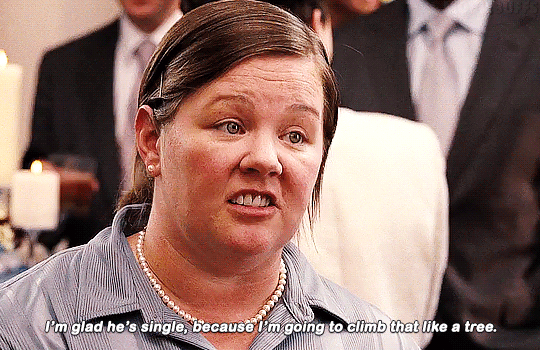
We also see from her confrontation with Daniel, she isn’t afraid to get harsh with a powerful man especially after she finds out that he has been using a female employee sexually and been denigrating her worth at the office.
We don’t know Perpetua’s physical prowess and she clearly prefers pearls to combat boots, but she does possess traits that are associated with men: logical mind, firm, self-reliant, witty, sharp-minded, a professional in a cutthroat environment, and is flawed while being formidable. Perpetua is strong, a Shonda Rhimes character that Rhimes herself hasn’t created. Sadly like most Tough Girls, she isn’t her own protagonist and is there as an accessory to the main character, the Trinity to The Matrix’s Neo and she is often the lone woman that Bridget interacts with at work. Tough Girls are counterparts to more “typical” women: traditionally feminine women who are softer and more emotional...Bridgets. One thing I want to note is that Bridget is the protagonist instead of a love interest but yet she stands alone as her friendships are not that positive and her relationship with her mother is strained. Like Ripley of the Alien series, Perpetua is the lone smart and strong woman who has to deal with a environment where no one else wants to listen to her and everyone is ruled by their emotions (or their libido). She is Joan Holloway, who weathers the misogynistic waters with her razor-sharp observations and commentary regarding the absurdities of the people who are around her, while not being afraid to command attention and others, even at the risk at not being truly liked but “admired”. Not a phony. Perpetua is a privileged woman but like I stated before, she dealt with a combination of body-shaming and misogyny that toughened her...but why should a woman be tough and hurt? We could have had a scene where Bridget encourages Perpetua to reveal her vulnerabilities and open up along with Perpetua pushing her to be more resilient over a spa day with face masks, pedicures, beer, Milk Trays, pizza, Terminator movies, and hair makeovers while discussing how to hide Uncle Geoffrey’s body.
Strong Independent Women
“The watch I'm wearin', I've bought it. The house I live in, I've bought it. The car. I'm driving, I've bought it. I depend on me, I depend on me.” Independent Women, Destiny’s Child
Imagine trying to reconcile feminist principles of not depending on male partners and rugged individualism that insists the opposite of what John Donne’s quote about how one person is a party of a larger community. You have the Strong Independent Woman, who is used by capitalism to sell feminism and face cream/Spanx/sanitary napkins/Wonderbras/lipstick, who needs no man (or interdependence) to thrive in a still misogynistic world. This misogynistic world also abhors the independence, self-assurance, self-reliance, and self-love of women who choose to follow their path. Meanwhile the non-mainstream feminist and environmental movement have pushed for a culture of interdependence and for a culture that doesn’t base one’s value on how much money or genius or beauty (or what have you) an individual possesses; Bella Abzug noted that “Our struggle today is not to have a female Einstein get appointed as an assistant professor. It is for a woman schlemiel to get as quickly promoted as a male schlemiel”.
But the image of the female individualist for one strong reason: women are still expected to perform the bulk of emotional and domestic labor while being paid less than their male peers for the same job, also because of ingrained sexism and perpetuated self-doubt, many women are still dependent on their spouses, parents, bosses, the opinions of others. It’s nice to see images of powerful, strong, often gorgeous women of wealth not have to depend on men for their worth or their livelihood. But we are flesh-and-blood human beings, not super beings or robots; even Perpetua shows some vulnerability when she refers to Bridget being a lot thinner than she and she is clearly looks crestfallen when she hears that Bridget has been belittled and used for her body by Daniel, we don’t hear much about her circle of friends in the movie aside from Natasha (in the book, she is friends with some same-minded women). Everyone needs an interdependent society of people supporting one another and helping each other grow.
Perpetua both upholds and subverts the tenets of the Independent Woman: she isn’t the supermodel-esque independent woman but Perpetua makes her own money and at lot of it, she dresses very well to project her authority in the workplace, she is bold, rejects the validation of male authority, and she isn’t afraid to be unlikable. She lives in a big city (because independent and single people don’t live in small towns or the suburbs *sarcasm*), presumably in her own spacious apartment or even a townhouse, she has found herself at some point before the story and has a strong sense of self, she works hard and has a strong sense of purpose because of her work ethic, and heaven help the dumbass that underestimates her or any other woman. She is a non-superpowered Carol Danvers: rather than waiting for someone to rescue her, she is quick to rescue herself from self-doubt or even rescue someone from injustice. She is noted to have a love interest, but she doesn’t revolve her world around him and is suggested to make demands for her needs in the relationship, showing she isn’t prone to fuckwittage as Bridget is (perhaps Perpetua learned to put a stop to that bullshit?). Of course because this is Bridget’s story, a woman who yearns for that fairytale ending of marriage, and this is a regressive, “post-feminist” (what sense does that make?) story, Perpetua isn’t a role model and is seen as a polar opposite to Bridget’s softness, ditziness, girliness, romanticism, and self-effacing persona.
I want to stop and say that I am so happy to be writing this essay in 2020, a year in which a large number of women (especially of color) have been elected to political office in record numbers with the Indian and Jamaican American Kamala Harris being elected as Vice President of the United States (and the first woman to do so). She is also independent enough to make her own money and develop her sense of self, along with a strong sense of agency and inter-dependent enough to credit the support and love she has from her blended family including her late mother. In fact the independent women of Broad City, Sex and the City, The Mary Tyler Moore Show, Moana, Mulan, and GLOW (crossing self) all have inter-dependent systems of support and are one another’s family (hell even Bridget’s so-called friends are her “Urban Family”). I also want to say, it’s highly likely that Kamala was more a Perpetua and not a Bridget (or else she wouldn’t have been able to succeed like she has done in her career), thus her win as Vice President vindicates Perpetuas who have worked and lived before her.
Working Women Do’s and Don’ts
“You're just a step on the boss man's ladder. But you got dreams he'll never take away.” 9 to 5, Dolly Parton
As established, Perpetua is happily single (but also partnered), she fulfilled in material comforts, she is unafraid to confront men about their bullshit (she has a hard time trying to get Fitzherbert away, I bet), and she has high standards. To paraphrase Charlotte Pickles, to thrive where she works she has to “eat, breathe, and sweat self-esteem” and she does. This is something that Bridget lacks and something I feel Perpetua can help her with. Sadly we never got that chance: the gentle and feminine Bridget and the stern and neutral Perpetua bonding in a mutually beneficial kinship. I’m sure that Perpetua wishes she could talk back to men like Julia Sugarbaker of Designing Women and that her role models came after some viewings of Working Girl, Baby Boom, and Murphy Brown and perhaps by the privileged and successful men (and a few women) in her family. It must be said that despite being referred to and clearly existing, we never see Perpetua’s boyfriend and that’s because pop culture has long depicted women in managerial and supervisory positions as lonely, ice-cold, unfeminine, and hard. Meanwhile more feminine women like Bridget don’t get the respect that Perpetua has and demands, and Perpetua lacks Bridget’s likability (Bridget of the many men and one woman who fall in love with her). While I wouldn’t consider Perpetua to be politically progressive (she is a woman of privilege and Sloan Rangers are considered Tories) but she isn’t a woman who is willing to exploit others for her own bottom line (or the corner office). We do see that she is quick to defend Bridget from slut-shaming or having her worth denigrated by Daniel, which leads to a rare scene of comcaderie between her and Bridget. I get the sense that Perpetua isn’t merely interested in ruling the workplace, but she wants to change the workplace enough to be less toxic (getting rid of Daniel and Fitzherbert).
I can find some similarities to Perpetua in three fictional characters known for their drive in the workplace: Dr. Christina Yang (Grey’s Anatomy), Peggy Olson (Mad Men), and Princess Carolyn (Bojack Horseman). Christina Yang, like her creator Shonda Rhimes (if you are reading this Ms. Rhimes or someone writing or interning for her, please feel free to take ideas for a film or show about Perpetua, I need cheddar), is proudly childfree, dominant, blunt, up for a good time, and voraciously sexual and ambitious. Like Perpetua, she doesn’t aim to please others and very performative in her actions and words along with being caring and brusque (and snarky, especially about the terrifying Mr. Blobby). Also like Perpetua, Yang finds comcaderie with a bubbly young blonde who is sometimes reduced to her beauty (Izzy as played by Katherine Heigel) and tries to lift her girl friends up. While Perpetua has been working in a post Cold War publishing company, Peggy Olson is a young woman from Brooklyn working at a advertising agency in the 1960s, with different struggles from her more “sexier” counterpart (Joan is a more confident Bridget after all, and Peggy has some BJ traits). Peggy is also a trailblazer for assertive working women of today and paved the way for Perpetua across the pond, setting an example from the ground up (partly observing the men above her) when she wasn’t able to find much female role models that didn’t rely on their sexuality or follow a traditional path. Women during that time didn’t have reproductive freedom, equal pay (still, sigh), and working women were shamed for wanting to follow a different path. Peggy also deals with fatphobia in Season One (she was actually pregnant) and divorced herself from her sexuality temporarily (but she experiments with sex and drugs throughout the series). Like Peggy, Perpetua isn’t crippled by Don Draper’s self-loathing (Bridget) or lack of discipline (Daniel) and Perpetua had to learn to believe in herself rather than merely rely on the validation of others. Princess Carolyn is a pink, perky, girly girl cat but like Perpetua she has a relentless drive, is intelligent, hard-working, can sell something (a celebrity image or books), and knows how to positively influence certain people around her. All these women have lived by their own self-definitions and owned the struggles they endured to get ahead.
Can’t Be Tamed
Walter Stratford: Hello, Katarina. Make anyone cry today?
Katarina Stratford: Sadly, no. But it's only 4:30. 10 Things I Hate About You (1999)
Rom Coms (such as Bridget Jones’s Diary) have a nasty habit of wanting to tame, soften, tone down, settle down an independent woman with her strong mind, sharp tongue, active sex life, and own money to matrimony. Then we have heroines who are allowed to fly their freak flag and find their own tribe (or leading man). That is Kat Stratford, the teenage feminist protagonist of 10 Things I Hate About You, a girl that Perpetua would have been at that age if she were American with blonde, pretty privilege. After all Perpetua has been perceived by Bridget (a Bianca without wit or spine) as a “heinous bitch” as delivered by the fabulous Allison Janney; they are perceived as difficult women who rain down their parades with their truth and don’t suffer the foolishness of arrogant men. Such women are supposed to be tamed, which has several meanings. The negative being to “tone down” or “dominate”; an alternate definition has been offered by The Little Prince’s fox “to earn one’s trust”.
We don’t know if Perpetua has anyone, romantic or platonic, to complement her personality and balance her out as Natasha seems to have Perpetua’s negative traits. This is where she and Bridget could have developed a friendship, combining vulnerability and a disdain for the fickle opinions of others and keep from having to choose between love and career, between relationships and financial independence. We could have seen a closer relationship blossom over the story just as Bianca and Kat grow closer to one another in the film. Maybe Bridget demanding more from Mark at the end, telling him that just because he bought her a new diary it doesn’t mean that he can get away with walking away from her and that it makes up for how tight-assed he can be with Perpetua cheering her on and another scene where Bridget smiles and let’s Perpetua squees over something in excitement.
Like Kat, the Perpetuas can find their own tribes or mates.
Women of Privilege in Media

Rich bitches, girl bosses, sassy queens, matriarchs, as Christopher Rosa noted about these women (which includes Perpetua): "They're rude, they're loaded, and we love them for it.” In a world that hates empowered women, as bell hooks bluntly noted, these Regina Georges, Cheryl Blossoms, Alexis Carringtons, and Perpetuas take back that slur and wrap it up in designer couture and fabulous accessories with nary a hair out of place. They own the negative stereotypes and manicure it into an image of fearlessness. They reject the social pressures placed on women to be nice no matter what, likable, fade into the background, and talk themselves down. Rich bitches indulge themselves with no apology and wear their strengths as boldly as their statement jewelry. But what if you don’t want to be bitchy all the time, what if you want to channel that fierceness into something constructive?
#Girlboss is an atom and a half: traditionalists argue that she isn’t a proper “feminine” woman who loses out on heterosexual love and children (”true womanhood”) while many feminists argue that she simply advanced to a seat in the patriarchy and doesn’t give a damn about the little people below her enough to truly make positive changes. Pop Culture has four flavors of the this character, as noted by The Take: the Bitch Boss, the Pre Code Boss who acts the way we think women started acting like after 1968, the Feminine Boss, and the social media savvy Girlboss who starts companies with cutesy names like WAHAM or WEEMAN or GOOP and they are often white and conventionally attractive. The last flavor exploits feminist phrases while selling out to capitalism and patriarchy for women to buy more shit and willing to step on people’s heads while building her empire. Sometimes she’s Charlotte Pickles, a somewhat ruthless but loving mother and CEO who loves angora sweaters, is glued to her phone, and can effectively hit the roof of a overturned boat with her high heel. Perpetua may seem standoffish to care only about her bottom line or take on traditionally masculine traits like Ruth Chatterton in Female or Diane Keaton in Baby Boom, but she proves to be a Leslie Knope when she stands up for Bridget in a heated moment. Perpetua has no necessity for large pink letters or catchphrases to prove she is a powerful (and empowered) woman, she simply is. One can see Perpetua taking over Pemberley Press, first Daniel’s job and then ousting Fitzherbert and taking his position, thus ousting misogyny from that workplace and using her power to uplift more voices in writing.
Bridget and Perpetua, meet, Betty and Veronica (respectively). While the Bridget the Nice Girl avoids her issues (and Betty can be in danger of being subsumed by them), Veronica and Perpetua make their rules and are willing to break them. Like Perpetua, the teenage Veronica wears her posh prep clothes proudly with a string of pearls and headbands holding her shiny hair. Veronica is also confronting a system (and family legacy) that taints America and makes living so impossible for people who have no boots to pull the straps from and handicaps her to a pedestal. Perpetua seems to want her friend Natasha to snap up Mark Darcy (remember she knows nothing of Mark and Bridget) like Veronica in the CW reboot wanted Betty to do with Archie. Both want to work hard and be recognized for their merit, not wanting to depend solely on Daddy’s money, bucking long-standing patriarchal expectations of upper-class young women who were expected to marry a man from a similar class and have children to inherit the money. Perpetua and Veronica show a willingness to get down and dirty while being allies to their less privileged and/or more passive female comrades. They also wield their power to take down over-puffed authority figures who abuse their privilege and have attitude when a woman gets slut-shamed or otherwise mistreated. Remember Daniel and Mr. Titspervert, Perpetua’s specialty is ice.
Legally Blonde and Bridesmaids, etc.
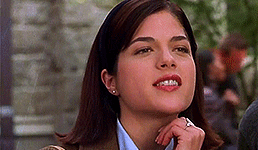
Vivian Kensington. Elle Woods. Professor Stromwell. These women showcase an alternative where cold but supportive women befriend our plucky blonde protagonist in a Playboy bunny suit and a douchebag ex-boyfriend (before ending up with a lawyer who comes off as uptight). Legally Blonde gifted Elle camaraderie with these women while Perpetua was left at the wayside and Elle was given a circle of supportive friends while Bridget had friends who negged her and were a poor influence on her confidence. Where Delta Nu gave Elle their time to help her practice for the LSATS, Bridget’s friends openly wonder out loud that Mark Darcy said he likes Bridget as she is, ditziness and unfashionable (of the time) curves and non-airbrushed looks (really?). We also see Elle add more people to her friend circle, like the working-class Paulette who proves to be mutually supportive of Elle and has been empowered by her to stand up to her ex and then we focus on two women who stand in for Perpetua: the steely Professor Stromwell ( the Mrs. Sarah Paulson, Holland Taylor) and the preppy Vivian Kensington (Selma Blair, la diva). Vivian and Elle start out as rivals for the handsome but douchey Warner Huntington III, who categorizes these women as the wife material Jackie and the fun and hot-tubbing Marilyn, but slowly upon finding out that their professor is a sexist who demands his young interns get him coffee and that Warner lacks Elle’s integrity find some common ground. Vivian is horrified and takes back her previous behavior upon hearing that their professor has sexually harassed Elle, reducing this intelligent and savvy young woman to her sex appeal. Also Professor Stromwell puts Elle on the spot on her first day of classes at and has a reputation for making her students sob, but it’s implied that Stromwell sees a bit of herself in Elle and wants this young woman to succeed and that means challenging her to do the hard work in Harvard. In the climax of the film, when Elle discusses quitting Harvard because of people undervaluing her intellect and being sexually harassed as a final straw, Stromwell turns around in her salon chair and tells Elle: “If you let one male prick ruin your life, you’re not the girl I thought you were.” Stromwell gets credit in Elle’s valedictorian speech at the end of the film. We see here that while Elle upholds girliness and finds new love in a established lawyer, unlike Bridget she has a support system of women (and a few men) who encourage her to kick ass and challenge the perceptions of others and celebrate her triumph in defending someone from a life-altering sentence.
I feel that in 2001, either Annie Mumulo or Kristen Wiig watched BJD and found the relationship between Bridget and Megan wanting as well as I did, this likely spurred them into writing Bridesmaids, a film that centered on women fighting over a best friend rather than a man, where the male love interest listened to the protagonist vent about her friend issues, and where an overweight and unconventional female secondary character pushes our insecure everywoman protagonist to start fighting for her goals and her sense of self, or rather her “shitty life”. Annie (Kirsten Wiig) is a former owner of a bakery that fell victim to the 2008 recession who is hitting rock bottom as her childhood best friend gets engaged and starts befriending her fiancee’s boss’s preened to perfection wife Helen (Rose Byrne) and then finds comfort and motivation in the form of the fiancee’s wacky sister Megan (Melissa McCarthy). Annie gets loonier as the movie goes on (ahem) until Megan persuades her to channel that spirit more constructively; Megan is proud of her hard-earned achievements and is confident but also kind enough to adopt several puppies and see Annie at her lowest. Megan earns her own money and demands more from her relationships than the other women in the movie (unhappy marriages, lack of communication, lack of trust) and emboldens Annie to grab life by the horns, thus starting a new friendship. It’s notable that this film is about post-college aged adults and the role of friendships in their lives.
Perpetua’s Potential

The 2010s have shown more narratives that focused on women’s relationships with one another and have even re-defined what “happily ever after” looks like and as a result of the #MeToo and #TimesUp Movements, women have examined how toxic their culture is to women and finding that the harassment and assault of women to be terrifyingly normalized and it has been for a long time. Millennial and Gen Z women have even questioned the issue of pitting women against each other, one of which is the “not like other girls” attitude that pits the cool babe or the weird girl against the high-maintenance girly girls that easily conform to society (even rewriting these types as friends or lovers to one another).
So what does that mean for Bridget Jones’s Diary? Well we could see a B Plot on Mark Darcy and his divorce from his Japanese ex-wife and she’d be given her own inner life and complexities, Perpetua might have to reconcile her relationship with Bridget and Natasha (the latter who is hostile to the former), we could see Perpetua strike up a friendship with her polar opposite Bridget and the narrative could focus on Bridget helping Perpetua open up her softer side while Perpetua gives Bridget the encouragement to stand up to her (admittedly) trashy family and friends and demand more from her relationship with Mark (or even dump him). We can even see them include Rebecca Gillies, the beautiful trust fund baby that works for Mark and finds Bridget to be desirable as she is (without being backhanded about it Mark!). We can see Bridget become stronger as she has one friend who challenges her to be better and another friend who finds her supremely wonderful and gets her to see it.
Maybe we can see Uncle G die, a girl can dream.
The Rise of the Perpetuas or what happened after Bridget drank some of Perpetua’s Juice
#MeToo, #TimesUp, #BossBitch, Lizzo, Ariana Grande, Lady Gaga, Katy Perry, Beyonce, Hillary Clinton, Alexandra Ocasio-Cortez, Ilhan Omar, the Notorious (and late) Ruth Bader Ginsburg, Jacinda Ardern, Michelle Obama, Jameela Jamil, Mindy Kaling, Tiffany Ferg, Kimberly Nicole Foster, Dahvi Waller, Gretchen Whitmer, #BlackGirlsAreMagic, Mothers of the Movement, CaShawn Thompson, Intersectional Feminism, Black Feminism, Mad Men, Mrs. America, Insecure, The Baby Sitters Club, Amy Schumer, GLOW, Emma Gonzalez, Candice Carty Williams, Malala Yousafzai, Kamala Harris, Meghan Markle...all of them have grappled with issues like Bridget and Perpetua and have even expanded the conversation about women’s day to day lives and the small (and large) ways society is misogynistic and have gone further to question why it’s so commonplace. We even see a talk about body neutrality (as opposed to the sanitized body positivity), which one can easily see Perpetua practicing. We also see women being held up in social media as being “stanned” for being difficult, wonderful, achievement oriented, sassy, fierce, outspoken, demanding, and fashionable...all things that Perpetua was put down for.
“I just took a DNA test, turns out I'm 100% that bitch
Even when I'm crying crazy
Yeah, I got boy problems, that's the human in me
Bling bling, then I solve 'em, that's the goddess in me” Truth Hurts, Lizzo
To paraphrase Whatever Happened to Baby Jane?: All this time, they could have been friends.
The year 2020 has been a dismal year for women’s careers as women are swamped with the demands of domestic life and bosses have shown that they won’t cut their employees slack for having kids in the background. People even explored how the pandemic has revealed cracks in society from economic disparity, how women are ultimately shouldered with the burdens of home that men aren’t expected to, how vulnerable marginalized communities are in systems with poor health care and systemic bigotry, and the lack of a social safety net. These are challenges I see Gen X, Millennial, and Gen Z women pushing back against (I will show up, pussy hat and mask on my person). One can even see Bridget, the ex Mrs. Darcy, Perpetua, and Rebecca marching in their Women’s March or even the global Black Lives Matter marches as they cheer on (or help) “tipped” over statues of colonizers and slave traders. We’d even see them attend virtual seminars on how to be better allies to BIPOC and listen as ex Mrs. Darcy talked about her difficulties as a East Asian woman in a predominantly white society and Bridget promising to call out her mother for her racist comments. There’d be no good woman/bad-woman dichotomy being perpetuated as they embrace each other’s differences.
#Complicated Women#Bridget Jones#Perpetua Bridget Jones#felicity montagu#Women in Media#Badass Women#Bad Bitch#misogyny#fatphobia#internalized misogyny#Fix Fic#Cool Women#Revisiting Characters#Flawed Characters#Womance#Women as friends#Character Foils#Character Appreciation#The more I think about it the more I am pissed off#Another example why Legally Blonde aged better#Girl Boss#Feminism#Tee Noir#The Take#Lindsay Ellis#White Privilege#Male Privilege#Privilege#Privileged White Women#Body Image
2 notes
·
View notes
Text
yup. don’t care.

prompt from @stars---thunderbird
“Do you not know who I am?”
“Yup. I just don’t care.”
***
Darcy was listening to music in the waiting room outside Fury’s office as he and Jane bickered. Fury wanted Jane to work for SHIELD. Jane was having none of it. Which, paradoxically, meant that Fury was offering Jane a pretty sweet deal: her own lab, 401k, healthcare, the works.
Meanwhile, Darcy was a little preoccupied with thinking about the Lumineers. Specifically, how hot the lead singer was. What was that guy’s name, anyway? She’d spent too much time watching him splash around in puddles in the video for “Ophelia” without gleaning that crucial bit of info.
Fury’s assistant looked at Darcy. “What kind of science to do you do?” he asked.
“The political kind,” Darcy said, grinning.
“Oh,” the assistant said.
“Mostly, I research rightwing authoritarianism,” Darcy said. The assistant looked dubious, then nodded politely. Darcy didn’t actually work on that; sure, she’d once written a seminar essay on rhetorical appeals to tradition in authoritarian regimes, but she knew that was the kind of talk that made people at SHIELD a little jumpy. Hiding her grin, she went back to her music. Very faintly, she could hear Jane yelling. She would intervene if Jane reached a certain decibel level, but really, didn’t Fury deserve to hear Jane’s lecture on the evils of research theft in person? The dart board they kept in London with photos of SHIELD officials she’d swiped off the internet had heard it enough. Darcy had heard it enough.
They were still waiting for a verdict from the other room when a phalanx of men in tactical gear came into Fury’s office. “Need to see the director,” the man at the front said. The assistant looked a smidge nervous at his tone and stare.
“Well, Commander Rumlow, I’m afraid---” the assistant began.
“Immediately,” he added. Darcy snorted. Loudly. Several heads turned in her direction. She was unwrapping a Tootsie roll that she’d just located at the bottom of her messenger bag. So far, the highlight of this SHIELD visit. She realized the commander guy was staring at her. “What was that?” the guy said.
“Do you just not understand the social cues for your boss is already in a meeting? Or were you just raised by assholes?” she said, popping the candy in her mouth.
“Do you not know who I am?” he said. Darcy sized him up as the lead captain of the jack-boots, given how the other guys were now looking at each other nervously.
“Yup,” she said, chewing. “I just don’t care.”
He gaped at her. His mouth actually opened and shut again as he took a breath and then his head tilted. Darcy started to laugh again. “You look sorta like a puppy seeing a Rumba for the first time, my dude,” she said. “Are you unfamiliar with people not being impressed with your whole I’m a secret fed here to rendition to you to the moon schtick? Because most of us--out there in the real world--think you’re draconian, unlawful, and let’s be honest, a little ridiculous-looking. Dirty Harry left the zeitgeist in, what, 1981? Human rights are trending now. You’re a dinosaur--” she was saying, when Jane came busting out of Fury’s office with Kool-Aid Man velocity.
“Let’s go!” Jane yelled. Several of the agents actually scattered. Darcy hopped up, beaming.
“And that’s my cue to skedaddle,” she said.
Read more on A03.
21 notes
·
View notes
Text
i got tagged by @gaysails so here are Six Movies I’ll Watch Over And Over:
2005 pride and prejudice - HAND TOUCH AND “Mrs. Darcy” AND BINGLEY’S SURPRISE VISIT LISTEEENNN
Pacific Rim - “but when you’re in a jaegar, you can fight the hurricane” and charlie hunnam in chunky sweaters and idris and ROBOTS FIGHTING GIANT MONSTERS IN THE RAIN FUCK ME UUUP
Warrior - "TAP TOMMY JUST TAP” like listen if u wanna cry like really cry like feel ur heart ripped out ya goddamn chest and choke on it then watch this movie. also the best soundtrack, the best cinnamontopography the best the best
Magic Mike XXL - the odyssey with strippers. watch this movie. feminist. gorgeous. stellar.
the princess bride is likewise an inextricable piece of the zeitgeist and inigo and fezzik invented banter (literally leaving this as is thanks molls)
the breakfast club b/c honestly its an A+ movie but also because its my goddamn childhood.
aaaaand i’m tagging my only three friends on this site @kingsleyshacklebolt @skiwalkerrey and @cabeswater-kid
4 notes
·
View notes
Text
Fever Pitch: Baseball Gods Bless the Rom Com
Getting a film made is extremely difficult, from writing the script to securing the financing, and getting a good film made can be even harder, from getting the right casting to coordinating the shoot. And sometimes, getting some of those elements right combines with timing in the cultural zeitgeist for a film to become a defining moment in society. Fever Pitch (2005), directed by the Farrelly brothers, misses on several fronts, but had incredible timing with the rise of the Boston Red Sox’s improbable journey to winning the 2004 World Series, elevating a sub-par rom com to a par rom com, due to a quirk in timing by the baseball gods.
Ben Wrightman (Jimmy Fallon) is a school teacher with a huge obsession for the Boston Red Sox baseball team. He meets Lindsey Meeks (Drew Barrymore), an executive who is majorly out of his league, but after an eventful first date, the two nevertheless hit it off and begin dating. Their romance goes well....until baseball season hits and she sees the true depths of his devotion to the team. Wrightman is a season ticket holder and there are 81 home games in a the baseball schedule - a long and grueling season for a casual fan, but even more demanding when your new boyfriend insists on attending every single game and cheering with the passion of a thousand burning suns. After an embarrassing incident compels Meeks to stop attending games, their relationship takes a turn when she dares to ask him to miss one game for a date night out. He initially enjoys the quality time with his girlfriend, but when he misses a particularly exciting Red Sox game, he immediately regrets the night away from baseball. This strain ends their relationship. Wrightman comes to regret his decision to choose baseball over the love of his life, so he decides to sell his season tickets. Meeks races to the ballpark to stop him, dramatically running across the field in the middle of the game to ensure he doesn’t lose his passion and to declare her love for him. To cap off their reunion, the Red Sox manage to win the World Series that year, with Ben and Lindsey attending the championship game as a great start to their new life together.
Jimmy Fallon is now known for hosting The Tonight Show and before that a great career on Saturday Night Live. Many alumni of that award-winning show attempt to translate their personas to a successful acting career and Fallon was no exception when he left the program in 2004. Fallon only managed to headline two movies before he made his way back to television as a host. Fever Pitch is exhibit A in why this transition took place; Fallon is just not up to the level of Barrymore in regards to acting chops. Barrymore is hustling hard to convince viewers that her strong, accomplished, and competent female executive would fall for a rambling immature boyman with a terrible haircut. Suffice to say, their chemistry is sorely lacking for a romantic comedy pairing; she is simply not weird enough to convincingly fall for his weirdness. The film producers were clearly banking on Fallon’s charming personality coming through the screen - the one that shines so brightly on late night tv - but it just didn’t quite work for his film career.
The actors’ mountain to climb was made further daunting by the presence of a flawed script. One of the most important components of any rom com is the meet cute sequence at the beginning of the film - two strangers meet in a quirky circumstance that at once displays their incredible chemistry, but also sets up some sort of challenge to their eventual union. The meet cute in Fever Pitch is rushed, extreme, and not very cute (involving vomit and unearned intimate trust from Meeks in this stranger she has just met). From this initial rushed sequence, the film’s script thrusts the viewer straight into their relationship, not even giving the audience time to form any type of connection with the characters before expecting us to be all in on this “charming and quirky” couple. As Wrightman’s deep and lasting relationship with the Red Sox exemplifies, it takes more than a compressed scene or two to root for the home team…either that or the actors weren’t up to the task of quickly making an impassioned impression on the viewer. On a side note, the film presses pretty hard into their class differences, but it should be stated that Fallon’s character has first level season tickets on a school teacher’s salary, which would be incredibly expensive; in fact he tries to sell them in the climactic arc of the film for $125,000, which only points to flawed logic attempting to create false tension. The film is adapted from English writer Nick Hornby’s 1992 book of the same name, as well as a 1997 film starring Colin Firth (one must assume that Mr. Darcy displays more charm than Fallon in the source material), but the “pitch” referenced to in the title is not a baseball flung to a batter; rather, it refers to the playing field upon which soccer is played. One wonders if the adjustment of sport and country wrecked the story’s translation to American audiences.
Despite the challenges of the main narrative, the final sequence (slightly) elevates the film, giving it a shot that the movie could remain a footnote in film history instead of merely fading into unknown obscurity. In an incredible stroke of luck, the timing of the film’s production schedule and narrative content matched the historic rise of the 2004 Boston Red Sox team who were fighting for a chance to win the World Series. The original script had the team losing at the end, but the baseball gods were not about to let the magical Hollywood ending down. Barrymore, Fallon, and a slim camera crew were able to get into the stadium during the final game and rushed the field when the team ultimately won. Although the footage does feel a bit tacked on to the end of the story, it is riveting filmmaking that conveys the specialness of the moment they captured. If only the entire movie leading up had earned these final glorious moments.
Overall, the film is a bit of a mess, but deserves note because of the electric ending. Barrymore demonstrates her years of professionalism, especially when set opposite of a neophyte who eventually moved his career in a different direction. The script could have used a few more edits to smooth out the meet cute and punched up the language, making one wonder how this compares to its source material. Ultimately, the film cautions against throwing all of your passion into just one thing, reminding us all to find a balanced life, but also that it is better when your team wins the World Series.
0 notes
Text
The Specialist: Links and Resources
by ChrissiHR
A compilation of links and resources used while writing World War II period piece, The Specialist in GhostCrumpet's Victory Girl verse, that isn't necessarily historically accurate, but pays homage to the zeitgeist/vocabulary/patterns of speech of the time during which it takes place. Until period accurate army resources can be located for certain army docs, modern army regs and rules may be listed instead, in some cases. (Also includes some writing/editing resources.)
Words: 230, Chapters: 1/1, Language: English
Series: Part 2 of The Specialist: a Victory Girl AU
Fandoms: Captain America - All Media Types, Thor - All Media Types, Marvel Cinematic Universe, The Avengers (Marvel) - All Media Types, The Avengers (Marvel Movies), The Avengers - Ambiguous Fandom, Avengers (Comics), Avengers Assemble (Cartoon)
Rating: Teen And Up Audiences
Warnings: Creator Chose Not To Use Archive Warnings
Categories: Gen
Characters: Darcy Lewis, James "Bucky" Barnes, Steve Rogers, Peggy Carter, Howling Commandos, Howard Stark
Relationships: James "Bucky" Barnes/Darcy Lewis, Peggy Carter/Steve Rogers
Additional Tags: Fanwork Research & Reference Guides, Research, Links, resources, World War II, Alternate Universe - World War II
from AO3 works tagged 'James "Bucky" Barnes/Darcy Lewis' http://ift.tt/2okps6D
via IFTTT
4 notes
·
View notes
Text
Bay Leaf - Axel Cluney (Zeitgeist)/Darcy Lewis
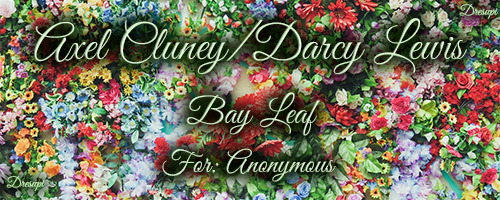
1,175 words
Rated T
Bay Leaf - Unexpectedly moving on from an ex
~~~~~~~~~~~~~~~~~~~~~~~~~~~~~~~~~~~~
“What are you doing here?” Darcy asked, frowning as she leaned in her doorway.
“Wade sent me. Said you had some shelf or something you needed help putting together?”
Axel wasn’t exactly the person she’d expected Wade to send, but she was secretly glad that Wade himself hadn’t come to offer his help. He was kind of bad at these ikea shelves. Not that she was much better, hence the need for a master Ikea carpenter.
Also Axel was eye candy. To her. So thank you, Wade.
“Okay, well... thanks. I can feed you.” He frowned. “In payment,” she reiterated, only for Axel’s frown to deepen. “Unless you’d rather I just gave you cash?”
“You don’t have to give me anything,” he said. “I’m helping you because I want to. Not because I need pocket money.”
Her face went red hot as she stepped out of the way so he could come inside. “Sorry, I didn’t mean--- I just figured you were doing a favor for Wade and I didn’t want you to waste your time.”
“Why would it be a waste of time?” he asked, reaching back to tug his hoodie off and rucking up his t-shirt in the process. “Thought we were friends.”
“I mean, yeah we are. I... because... I dunno, I’m rambling to delay the inevitable...”
The inevitable being when he saw the state of her living room. When she called him eye candy, she wasn’t kidding, but the crush went a little deeper than that. It went to the point where she was embarrassed to explain exactly why her living room looked like that.
“Whoa,” he said, folding his hoodie in half and looking around the bare room. “Your boyfriend rob you when he left?”
She exhaled, shaking her head. “No. I wanted the bedroom furniture, so he took everything out here... I---I let him take it. No robbery necessary.”
He looked surprised. “Oh, I just kind of assumed all that stuff was yours. Didn’t look like the kind of guy who’d own a purple couch.”
She snickered. “He wasn’t. It was all mine. I just... I let him take it because, I don’t know. I was probably going to get rid of it anyway. I mean... it’s just stuff, right?”
She could feel Axel’s eyes on her, and she hoped like hell he wouldn’t say anything more on the subject, because it was sensitive. And inherently linked to her aforementioned crush turned more on a certain acid-puking mutant who was currently present.
“If it’s something you wanted, you could have kept it.”
“Yeah, but I felt bad. Because like... he didn’t have anything and he was moving in with a friend and... and then I found out he wasn’t moving in with a friend, he was moving in with the skank he cheated with, so now she’s got my purple couch and all my cool end tables and I have to go to Ikea to get sad single person crap because it’s going to take time for me to accumulate more stuff and I just...” She inhaled and exhaled again, loudly, closing her eyes and shaking her head. “She’s not a skank. She had no idea he was with me. I’m projecting my anger onto her because I can’t be mad at him and I don’t know why.”
That was a lie. She knew why.
“You still have feelings for him,” Axel replied, moving over to the first of the boxes and pulling a pocket knife out of his back pocket. He unfolded it and cut the tape. “I mean, I would assume. I’m not a shrink or anything.” He folded it back up and stuck it where he got it.
“I don’t though,” she said. And maybe she just imagined the sudden look of interest on his face, but she went with it. “I actually haven’t for a while, I was just too chicken-shit to leave him and now I’m mad because he beat me to it. And I guess that’s why I let him have the stuff. Because I felt that... subconsciously... he knew I stopped feeling anything for him and that’s why he cheated.”
Axel snorted derisively. “No. He cheated because he’s a piece of garbage. You stopped feeling for him because you---to use your own word---subconsciously knew that.” He pulled what was inside the box out onto the floor. “Now, if you’re through dissecting your shitty ex-relationship, get over here and help me with this.”
Darcy smiled a little and sat down beside him.
“You don’t wanna know the real reason I fell out of like with him?”
“You could make me a happy camper and tell me his dick wasn’t big enough.” He smirked in her direction and made a grab for the little bag of hardware that came with the shelf pieces.
“I don’t really care about that.”
“Okay, then I don’t want to know, because this isn’t eighth grade lunch and I don’t have a science test later.”
“Suit yourself,” she said, sniffing as she reached for the instructions.
“You’re not going to tell me anyway?” he asked.
“Nope. Because this isn’t eighth---“
“Just tell me, Darce.”
Her face flushed as she peered into the direction booklet like it was super interesting or something she could actually decipher. “Maybe fell in like with someone else.”
He was silent for a long moment, lining up the pieces. “Someone I know?”
“Yeah.”
“How well do I know them?” he asked.
“I dunno. Depends. To use your words, I’m not a shrink or anything.”
“Oh,” he said. And that was all he said. But he didn’t talk a ton either, so Darcy didn’t really worry about it.
That was a lie, she totally did. But when she worried, she worked, and that seemed to help matters in reference to her pile of ikea boxes.
Between the two of them, they got both coffee tables put together, and the biggest of the bookcases before Axel’s stomach growled and she jumped so much that she dropped two of the loose shelves on the floor with a loud crack.
He turned towards her. “Jumpy much?”
“Yeah? You would be too if I notoriously puke flesh burning acid and my stomach started making sounds.”
“I’m hungry,” he said in way of explanation.
“I said I’d feed you.”
He shook his head. “Nah. I’ll feed you. There’s this pizza place near here.”
“They deliver?” she asked.
“Yeah, but we’re just gonna go eat in,” he said, reaching for his hoodie.
“Not sure if we have time for that...”
He tugged it over his head. “We do. And you look like you could use a nice gesture.”
“Is that all it is?” she asked, slipping on her shoes.
“Depends,” he replied.
“Depends on what?”
“On if you’re actually upset over losing the furniture, or losing the guy who took it.”
“I freaking loved that couch, Axe. You know that.”
He smiled then. “Then no. That’s not all this is.”
“Okay,” she said. “Good.”
“Good?”
“Good.”
He nodded. “Good.”
#Acidtaser#Darcy x Zeitgeist#Zeitgeist x Darcy#Darcy Lewis#Zeitgeist#Axel Cluney#Darcy x Axel#Axel x Darcy#Darcy/Axel#Axel/Darcy#Darcy/Zeitgeist#Zeitgeist/Darcy#Flower Language Prompts#orange#Anonymous#my writing
21 notes
·
View notes
Text
The Specialist: Links and Resources
read it on the AO3 at http://ift.tt/2okps6D
by ChrissiHR
A compilation of links and resources used while writing World War II period piece, The Specialist in GhostCrumpet's Victory Girl verse, that isn't necessarily historically accurate, but pays homage to the zeitgeist/vocabulary/patterns of speech of the time during which it takes place. Until period accurate army resources can be located for certain army docs, modern army regs and rules may be listed instead, in some cases. (Also includes some writing/editing resources.)
Words: 230, Chapters: 1/1, Language: English
Series: Part 2 of The Specialist: a Victory Girl AU
Fandoms: Captain America - All Media Types, Thor - All Media Types, Marvel Cinematic Universe, The Avengers (Marvel) - All Media Types, The Avengers (Marvel Movies), The Avengers - Ambiguous Fandom, Avengers (Comics), Avengers Assemble (Cartoon)
Rating: Teen And Up Audiences
Warnings: Creator Chose Not To Use Archive Warnings
Categories: Gen
Characters: Darcy Lewis, James "Bucky" Barnes, Steve Rogers, Peggy Carter, Howling Commandos, Howard Stark
Relationships: James "Bucky" Barnes/Darcy Lewis, Peggy Carter/Steve Rogers
Additional Tags: Fanwork Research & Reference Guides, Research, Links, resources, World War II, Alternate Universe - World War II
read it on the AO3 at http://ift.tt/2okps6D
2 notes
·
View notes